#but basically certain things in foreign languages are required to have a translation to either french or english
Note
Existing is cool. We all exist in some capacity.
I hope you do well in the seal of biliteracy test! I personally have another few years before I need to take it, and that will be in French most likely.
Hopefully if I do write a fanfic you will just end up finding it in the wild. Not likely but it could happen
Anyway, I hope that you start to feel more human later.
From⚙️
Existing is pretty cool! And thank you. I have no clue what my scoring is gonna be on that one, because I know my speaking section was...subpar at best, but maybe the other 3 sections were good enough to offset that? Who knows!
At least you know that it's a possibility! I didn't even know the seal or the test was a thing until like a month ago when I got an email like "hey quil sign up to take this test you took enough foreign language credits for it" like...you mean the courses I took...over a year ago??
just because I have an associated in spanish doesn't mean I know what I'm doing
And even if its unlikely for me to find your fic in the wild, I can still hope! I mean, i'll never know whether or not it was yours, but still! But yeah unlikely. I don't read a lot of fanfic, actually. Like 95% of the time I read a fic it's to support a mutual who wrote it, not because I particularly felt like reading fics. Ironic considering I'm a fic writer, but true.
Thank you for the well wishes though! I'm not particularly concerned with feeling human, but I understand and appreciate the sentiment, and I wish the same for you!
#quil's queries#⚙️ nonsie#i took 2 french classes once upon a time#because for my spanish degree I was required to take a second foreign language too#but my asl didn't count#so there was one semester I was taking spanish and french and asl (3 foreign languages) all at the same time#I. would not recommend doing that#i now know practically zero french and my spanish and french got mixed up for months after that#the asl was fine though. i think a sign language and a spoken language can be learned together a lot easier#so that part wasn't bad#it was the spanish and french at the same time that fucked me up#but I'd like to learn french one day#that way I know the two. what are they called. not universal#but basically certain things in foreign languages are required to have a translation to either french or english#so I'd like to know both#oh this is gonna bug me hang on gonna ask my dad#oh apparently I was right! french and english are considered the universal languages#and on the ship (he was in the coast guard) it needed to be in either english or french and the local language#so. there's that
2 notes
·
View notes
Note
tell us more about the languages katherine learned! why did she decide to learn those languages specifically? did she have any trouble with any of them? which ones did she find easy and which ones did she find harder to learn? did she have any help when she was learning them? how did she deal with shedding her accent?

(sent in probably in addition to this headcanon)
first of all, i want to thank you for your questions (your interest means a lot). i also want to apologize for the late response. ♥
i portray my katherine as someone who is descended from a wealthy and noble family (see headcanon here) which means she already had received an appropriate education. by 1490, she could already read and write bulgarian (and they have the cyrillic alphabet). since noble children usually learn more than one language, she was capable of speaking bits of other languages as well (probably english / french / russian?). the show tells us that she quickly became 'english' once she was banished & lived in england which is why i think she already knew a few basics of this language but perfected it during her stay. i think perfecting an entirely new language (and alphabet) in less than two years is a peak output, especially considering her (emotional) stressful situation. when she talked to the mikaelsons, there was no audible accent and she was capable of communicating with them in perfect english.
there’s also a cut scene in 3x15 of the originals in which katherine sent a letter to elijah asking him if he allowed her to read him the poem 'farai chansoneta nueva' which is in french. which means that katherine spoke and was able to read at least three languages by 1492.
katherine is incredibly smart but she's not really a patient learner. she could never visit a language school or use a vocabulary book. i think she picks up a lot by listening to others whereby she will memorize the usual phrases beforehand to not stand out if she visits a new country with a new language. i can also imagine her having a compelled 'teacher' (or more like a tutor) that helps her translate and learn things.
katherine speaks bulgarian, english, french, german, russian, spanish, italian, and a little bit of czech & latin. while i think she already had (at least) a basic education in bulgarian, english, french, and russian while growing up, she learned the other languages during her flight as soon as it was necessary for her to learn them (mostly whenever she traveled to a new country). she had long stays in france, italy, russia, spain, switzerland, and germany/austria and during this time she either completely learned these languages or perfected her existing knowledge. to her (and her safety) it is necessary to learn the language of the country you hide in. and simply learning is not good enough, one needs to master it, otherwise, you'll stand out and won't be able to blend in. she didn't learn swedish or finnish, for example, because she's not interested in staying in these countries (as they are too cold for her liking).
of all the languages she learned completely new, german was the hardest and this language is still an issue if she has to use it again after a longer time has passed because german has a tricky grammar. the easiest foreign language was russian because it's similar to bulgarian.
she understands bits of czech but didn't bother to master it because she doesn't really like the language (and it also has tricky grammar). she knows a few bits because of her traveler heritage (and traveler spells are in czech which is also the reason why she doesn't like the language). she also only knows a bit of latin because she wants to understand spells in case she requires one (because she doesn't want to be tricked by witches). she doesn't bother to master latin because it's difficult for her to learn as it is a 'dead' language (and therefore she cannot pick it up by listening to others), it's also not really useful to her (apart from understanding certain spells).
shedding her accent is an interesting topic because she had a bulgarian accent in the beginning. but the longer she stayed in countries with another language (and the more she mastered different languages), the unrecognizable became her accent simply because she has so many 'base'-languages. if she would learn swedish now, for example, she wouldn't have a bulgarian accent. i think she definitely would have some kind of accent but i don't think one could pin it down to a certain region. nonetheless, she does recognize if she has an accent (and she will ask her teacher/tutor) and she will train the pronunciation as long as it's gone. again, she is a perfectionist and it's also not safe (as she would stand out and not blend in) if she's on the run and hides in an area where one would easily detect that she is foreign.
another thing that is interesting when it comes to languages is that while katherine might be able to speak the language perfectly, she isn't necessarily capable of also writing it perfectly (reading is usually no problem). for example, she cannot perfectly write in spanish but she can perfectly write in french because there was a time in which a lot of correspondences were in french (especially because she spent a lot of time among the aristocrats).
thank you so much for the interesting questions and i hope i have answered them all ♥
2 notes
·
View notes
Photo

How to start speaking in a foreign language?
"I can speak English" vs. "I know English"
Do you know a language vs. Do you speak a language? (Or maybe both)
As for myself, I can say I know some Japanese, but I can't really speak it. If you ask me about its grammar, I'll probably know the answer. But I'm not sure if I could go to Japan and communicate with people through voice (that's what "I speak Japanese" suggests). Many of us, language learners, end up knowing a language, while language is intended to be spoken in the first place. If you think about it, we speak more often then we write, read, or listen. So why do schools focus on the skills that we use less frequently? I don't know. If you know, let me know! The only reason I can think of is that language learning in schools is focused on taking exams and those are always written, rarely spoken. So naturally, we study in silence. But how often do we take exams after graduation? Job interviews, shopping, small talks, etc. are always conducted through voice and not a written word.
Someone has messed up here!
Learning to speak
Speaking is hard, whether it is your native language or a foreign language. With your native language, you have the advantage of countless hours of practice. There we go, here's the solution "countless hours of practice." SPEAK, SPEAK, SPEAK! That's the only way to learn speaking.
With your native language (I'm repeating myself, I know), you have the advantage of being surrounded by native speakers, and just simply living in an environment that forces you to use the language whether you like it or not. With a foreign language, you either have to leave your country or create situations that will allow you to practice. How to do it if there are no natives around tho?
Tip #1 At the beginning of your journey you don't need native speakers. Your teacher or friends are enough. They will help you break the language barrier (I know... sometimes it's hard to find friends or teachers that will actually help you instead of making fun of you)
Tip #2 Speak whether you make mistakes or not. You need to learn somehow. OUTPUT RIGHT AWAY! If someone didn't understand you, don't get discouraged instead, think "Ok, so what did I say wrong" And then look for the answer. It's not a crime to make a mistake!
Tip #3 Finding a good conversational partner takes time. You will find someone eventually. You need to message tons of people first, but trust me there is this one person or two or three people that will help you out!
How to practice
1. Talk to yourself. Do I sound like a maniac? Probably, but if there's no one around then what else can you do? If you feel weird doing this think about this

Example: Tell yourself about your day. Think about all the events that have happened and say them in your target language. Try to express your opinions in your target language. You'll find so many gaps in your vocabulary. Note them down and then look for translations.
2. Recreat daily activities in your target language.
Example: You go shopping in your native language. What do you usually say? Think about the words and phrases you use and then translate them to your target language (learning about cultural differences will come later, or you can search for those at the same time)
Tip # 4 Textbooks teach you standard phrases. But the real life is governed by its own phrases. Textbooks should serve as a base, a jump-off point, and then, it's on you to learn better, more natural alternatives.
3. Review things to yourself
Example: If you're done watching a movie or reading an article, say out loud what you think about it or what the book/movie was about.
4. Study pronunciation
Very often students are afraid to speak because they sound "weird." The only way to overcome this barrier is to learn pronunciation. I'm not talking about mastering a foreign accent, but about basic sound production. How to produce certain sounds, vowels, word stress, and intonation. Shadowing after movie characters or singing is a good practice.
Tip #5 My good friend June is learning Polish and she mainly speaks it. She's way better at speaking Polish than I am at speaking Japanese. I know more Japanese grammar and words, but she's the one who isn't afraid of speaking. Why? Because she has been speaking so much Polish that she got used to the sounds and intonation. She's aware of her off pronunciation but it doesn't bother her anymore. She got used to that fact.
5. Record yourself
Cringe, cringe so hard when you listen to yourself (it's part of the deal). But it's enlightening! Trust me. You will become your own teacher. You will hear your mistakes. Then record yourself again and again and again until you're satisfied.
Tip #6 While studying pronunciation you will feel weird because different languages require different mouth movements. Japanese and Polish can be spoken without opening one's mouth, English on the other hand, requires you to open your mouth wide. You'll get muscle fever in your face but it means you're going in the right direction. If it feels weird it doesn't mean it's wrong. Your muscles are just not used to such movements.
There is no other way. It will be painful, cringy, and frustrating, but it will pay off.
69 notes
·
View notes
Text
Barriers to communication-By Oliver Boughey
In this blog I will be discussing the five main barriers to communication in the workplace. These barriers can be subject to disability, poor habits or lack of communication skills and I will discuss what they are as well as how to overcome them.
The first main barrier to communication I will talk about is language. In a world where migration down to business is common it can be helpful to have basic translation skills to avoid any misinterpretation. If people fail to be able to translate then this can often lead to communication being very difficult and by difficult I mean nearly impossible. If employees have no way of communication then they are heavily more likely to be less productive and more likely to create errors that could be avoided with basic communication skills. People may also have to be able to break down language barriers when speaking to clients as oppose to employees. Businesses may conduct business with companies abroad so it is vital that someone is able to establish communication for things to run effectively. This first language barrier can be broken down in multiple ways with the first of which being to attend a language class to help gain a basic understanding of foreign accents. Online translation is also possible such as google translate however it requires you to be able to identify accents which is something the user has to be confident with. People can use the aid of free mobile apps to help learn languages and they can also hire the aid of a personal translator however this is on of the more costly options and is considered generally to be a less resourceful solution.
The next main barrier to communication is often the most common barrier and one everyone will experience which is noise. Often background noise may prove a distraction to those hoping to communicate however it must also be said that many times it can be completely avoided and I am going to explain how. If you were on a business call and there was loud noise coming from outside such as traffic or someone mowing the grass then this may cause auditory issues for you and whoever else in on the call however, if you were to communicate via headset then this may not be such an issue anymore. Most companies will hand out basic computing equipment such as a company owned laptop, keyboard, mouse, chat headset and more to their employees so much of the time the solution is very easy. If you don't have any of those items then they can be purchased quite easily and often at budget price. This same distraction may occur if you were in a conference room with other people and if this is the case then this means you may be forced to isolate the room of noise as much as possible which means often closing all doors and windows. To further help this matter the person organizing may have to bring a microphone so it is certain that they can be heard over any and all background noise present. Background noise is generally a minor issue but it is best to deal with it as it can prove troublesome to some individuals more than others.
The third barrier to communication I am going to discuss is a lack of engagement. Lack of engagement can often occur during company presentations and when people lose focus in these then it generally means that they tend to take in less information which can prove a disruptive issue at a later date. It is the responsibility of the individual to make sure they are focused however there are some things that the presenter can do to make their presentation more engaging. Good body language combined with a loud clear voice is usually they key to getting the audience to become more invested into what you’re saying as it makes it seem as if you are enthusiastic about your subject and if you show enthusiasm them you are more likely to receive enthusiasm from the audience. A presentation doesn't have to be one way communication either so the presenter is able to ask and take questions from the audience and can also make small conversation with the audience too. By doing this the presenter is making the audience more engaged because the audience have now become part of the presentation so it feels like the presentation is happening with them instead of just being explained to them. These are all individually small modifications but combined they can make a big impact on how effectively communication can be carried out in group situations.
The fourth barrier is somewhat separate from the rest as it directly refers to written communication as oppose to vocal. Written communication is used in every day life and some examples of it would be: text, letters, emails, reports, presentations, news analytics etc... and with all these various examples of written communication there are barriers that can come with them. These barriers are often things such as poor grammar and spelling that can often cause misinterpretation and confusion. Best case scenario is that people still understand the work but it just looks unprofessional and amateur. Basic English skills should come given with most people and good grammar is something that should be expected as without it a variety of issues can be raised. If good English is something that people fail to get then the suitable solution would be to refer them to a personal tutor to further their skills in this department. Often grammar, spelling and vocabulary (when good) often go unrecognized but it becomes very obvious when someone's writing lacks all three.
The last major barrier to communication is differences in personnel. This is a broad barrier as it can refer to a great many things but I will single out the main differences that can cause barriers in communication. Things such as cultural differences and conflicting political beliefs can cause people to not get along with each other and when this happens communication often becomes more scarce between these individuals and this can end up resulting in less productivity and more chance of tension in the workplace. The direct fix for this is often team building exercises and trust building exercises that allow people of different genders, religions, nationalities etc... to learn to get along with one another. Allowing fellow office workers to gel will further promote communication between them and allow for a workplace in which back and fourth communication is utilized to allow for the best possible transfer of information and advice for employees. Worker based in IT always work as part of a larger system so it is common sense that having each of the employees be encouraged to communicate more for work purposes will only have a positive effect on the work system referenced.
1 note
·
View note
Text
One of the main things I get asked about or have mentioned to me is why I don’t as zealously translate things on my blog anymore.
There’s a lot of reasons, some of which I’ve addressed in the past, but they’re kind of persistent issues that don’t only affect me. They affect just about every other fan translator that I’ve had the pleasure of working with and they’re why you don’t tend to see the same people stick around for a long period of time.
This is going to come across as a vent-type thing, and it isn’t aimed at anyone in particular, but just at certain trends in fandom and social media spaces in general, so I’m not calling anyone out or anything.
Like I mentioned before, you tend to notice that a lot of people who translate things for a particular fandom will drift away after a certain amount of time. This isn’t an accident, nor does it necessarily need to be an eventuality. Some people will always move on because they lose interest in the source material, but I’m not talking about that today.
Reason #1: Work and Real Life
The biggest, most persistent issue for me is my job. I work long hours, I have a two-hour commute on a train each day, and my work is very stressful and demanding. Would I rather be translating? Hell yes! Can I support myself doing translations for free? Hell no!
When I was doing really hardcore translation stuff, it was basically me not sleeping. That was a thing I could do because my hours were shorter then and I got long breaks throughout the year. I was home and in my house by 18:30 every night which meant I had way, way more free time than I’ve had in the last couple years.
I’m not in school anymore, nor do I work part time, nor am I figuring things out at my parents’ or anything. I’m also getting older and more tired. That means I can’t afford to be translating a bunch of text for free and sacrificing all my free time and time to sleep. It’s a little unfair to expect me to compete with pro translators, people who work part time, or are in university, or NEETs who happen to be doing translation stuff.
Reason #2: Lack of Motivation/Lack of “Customer Loyalty”
I was going to call this “lack of reward” but there is an inherent reward to doing this kind of work and lots of people have been very vocal and kind about their gratitude, so it’s not necessarily that you never are rewarded.
However, I do need to address the elephant in the room.
Fandom is a fickle and impatient creature. It doesn’t care about quality, it cares about speed. The second biggest reason I don’t try to keep up the pace I was going at a few years ago is because there’s really not any strong motivation to do so aside from my own pride and a handful of people.
Let me try to explain what I mean: when you’re cranking out translations quickly, before anyone else has touched anything, then people will respond well. They’ll reblog your posts, donate small amounts of money, draw you fanart, send you nice messages. The second you stop cranking things out as quickly though, all of that dries up. Yes, a core group of people will stick with you, but the majority of the fandom just kind of moves on and latches onto whoever’s faster.
And it’s frustrating. It’s annoying that I can spend hours and hours and hours putting something together, only for it to get like 50 notes. My DRT summaries have been read by countless people, but the posts themselves have less than 10 notes in most cases.
People don’t really appreciate that translation is ultimately a creative act--it’s not just a mechanical process of Language In > Language Out, it require you to be creative in your word choices. Also they don’t appreciate the hidden work, like all the money spent procuring the original source material (which I always tried to do since I prefer to be self-reliant like a dumbass), or the formatting, or the TIME.
Meanwhile, people will reblog visual art that looks similar with no qualms, but if it’s a long translation, they won’t even bother to read other interpretations, much less spread them.
People remember the names of visual artists, and will promote them and yell about how they need to be paid and whatnot, but they don’t tend to remember the names of people who translated things. Fandom just doesn’t do that. Unless you stay relevant and in the public eye as it were, fandom at large doesn’t remember the people who did seminal translations of works.
They don’t have to, of course, but I gotta admit that it doesn’t really make me want to pour hours of my own limited free time into working on something that no one will care about or remember I did after the fact.
Reason #3: Cutthroat Tactics
As you can imagine, when speed is the only thing that matters, the situation turns toxic real quick. While you’ll meet a lot of other great translators, and everyone I’ve personally worked with has been fantastic, but I think the incident that best shows off what I mean is what happened with Yaz and someone taking his raws to release their own version before shslscans did. That happens all the damn time.
While a certain group of people will cooperate and try not to step on others’ toes or be respectful (the reason why I never finished kamase-megane’s DRK1 translation), there will always be other people who just jump in and do stuff and don’t even recognize you--they can’t, because if they do, they run the risk of people going to read your stuff instead of theirs, and as we established, the fandom will only read one translation and nothing else.
There’s also the issue of the audience themselves, who will do things like nitpick everything you post if they don’t like it (which happened to a friend of mine, who ended up having people attack them because their interpretation of the vaguely worded source text didn’t line up with what they wanted to hear).
There are also people who very clearly want to use you for their own advantage. You can always tell who these people are, because they will be up in your face and promoting you left and right until you need to take a breather, at which point they will drop you like a sack of potatoes and heavily promote someone who is doing the thing they want, but faster. They will also not circle back around and promote your version once you finish it.
The fandom will take your scans and your translations and use them without credit, gaining way more notoriety and attention than you ever could on your own (this happened to me last year on Twitter, where someone took a photo and translation I uploaded to my blog in 2014 and used it to garner LOADS of attention--while the Tumblr post that talked about the tweet credited me, the original thief never did, despite me politely asking).
Fandom will also turn their nose up at anything that isn’t a word-for-word translation. My summaries for the side novels are extremely detailed and I end up translating large passages anyway, and STILL people bitch that they won’t engage with summaries because they’re inferior. r/choosingbeggars much?
Part of the reason that no one remembers the translator or sticks with them if their pace drops is because there’s an unspoken expectation that the fandom is owed the translations. It doesn’t matter who they come from, but clearly someone has to do it, because it’s just a thing that fans are entitled to. That’s mind-boggling to me, who grew up with fan translations as the only way for me to experience a LOT of foreign language media. No one owes you translations of things as soon as they’re released!
Finally, it’s difficult to get your work even seen, because the market gets so saturated; all of the aggressive self-promotion often ignores what other people are doing, either because of sincere ignorance that your stuff exists, or because they’re intentionally ignoring you to make themselves seem like the only option.
Conclusion:
This is not a DanRon fandom problem; this is a fandom problem, full stop.
I can’t tell you what to do, or how to engage with fan translators and their work. This is more just a vent about things that irritate me about the whole scene and to explain why I don’t update as quickly or as often these days.
I do still want to get my version out there, and I will still do it--I was doing side novel liveblogs and summaries before anyone paid attention to my blog and I will continue on after--but I do ask that maybe you be patient, or you try reading different translations of the same thing to appreciate the various approaches. Remember who translates what and makes sure that you always credit and source. Reblog translation posts, don’t just like them.
Basically, treat us the way you treat visual artists.
Thanks for reading, and thanks to all the folks who have stuck with me through the years. Everyone who sends me nice asks and who has sent me art or liked or reblogged my posts, I appreciate all of that. You should be the norm, but you aren’t, and so I really love you guys. I’ll have some stuff for you very soon!
81 notes
·
View notes
Text
The Language of Gems
A Steven Universe Theory By ME!
TL;DR at the bottom
Have you ever wondered what language the gems are actually speaking? Did you just take for granted that Steven Universe is a children's cartoon so 'of course everyone can understand each other!'? Well I have a theory for you, one that I believe makes decent sense within the Steven Universe world.
I propose to you that Gems do not actually 'speak' as their native language (Native- as in the language one learns naturally from birth before any others). Instead I theorize that Gems as a race instead use a form of Short-Range Radio Waves or some form of short-range telepathy to speak with each other. Now before you start nay-saying hear me out, I actually have some canon content to work with as evidence.
So as we know, Gems are not organic beings. They do not need to eat, sleep, or breathe, and can withstand extreme temperatures depending on their Gem. So then, why would a race that does not need to breathe have any reason to form lungs (which requires either shape shifting or regeneration to change their form) in order to develop a language? Oh, no doubt they were quick to pick up on the languages of other intelligent species as they conquered the galaxy if only to make things easier for themselves in the long run, but they would have little to no need to do so before that point (This does not presume that Gems are a created Race who over threw their creators but even then their language would be vastly different).
So then with that in mind let me bring to your attention some canon details.
1. The first thing that brought this thought to my attention was during the episode "Bubbled" when Eyeball Ruby and Steven are floating through space.

Despite there being no atmosphere (which Science says you need to produce sounds such as talking) both Steven and Eyeball are able to talk and hear each other with Eyeball remaining outside of the bubble Steven has produced. Assuming that Steven's bubble is capable of producing the amount of oxygen he needs to survive inside of it, this would not provide nearly enough outside of it for Eyeball to create actual sound at volume within the void. So then how can Steven hear her? My first thought was Radio waves which are known to travel unimpeded through the void of space, and which can cause some crystals to vibrate at certain frequencies. (Feel free to fact check this part as I'm unsure whether all crystals are capable of vibrating when exposed to various sound frequencies but know that some can). The second thought was a form of 'telepathy' utilized by gems who create physical forms out of light.
2. The second instance that brought this to mind was in the "Human Zoo" arc, in which very much modern human Greg was kidnapped by Blue Diamond.
The first thing that got me was that both Blue Pearl and Blue Diamond were able to communicate with Greg without difficulty. Both being able to understand and be understood by Him after 5,000 years without setting foot on the earth. (I'm assuming this is the case, though if she had come to earth to grieve at the palanquin I can also assume that she was likely undisturbed during those times as what sane human would approach a giant blue woman instead of running away?)
The second thing was at the Human Zoo itself. There are several instances here that made me begin thinking about this theory in depth. The first being Holly Blue Agate and her responses to Steven, along with the 2 Amethyst guards who take him to be processed.
Holly Blue hears Steven speaking and comments "OH, their incessant barking. What is it saying?!... Oh, there it goes again with its hilarious noises." as if she either cannot understand what he is saying, or is hardcore choosing to ignore what he is saying in the same way we might ignore someone we find annoying.
The Amethysts also remark that 'Heh, these newer humans are so spunky.' in response to Steven yelling at them to let him go. It is unclear whether they actually understand the words he is using or simply his body language as he is squirming around and shouting.
Now between these instances and the start of their escape, Greg and Steven encounter the Zoomans. Humans who are descended from the ones taken more than 5,000 years ago by the Diamonds. English did not exist 1,000 years ago, and there is no way that the Zoomans and Greg should be able to understand each other with such ease when it is highly likely that Greg only speaks a few phrases of any other language beyond that. So how then could they possibly be able to communicate without more than a few small problems so instantly?
I bring up the earrings they are all wearing, and that both Steven and Greg were equipped with upon entering the Human habitat.

These little suckers are Gem Tech, and more importantly in my mind, likely the product of some overzealous era 1 Peridot who was told to find a solution to the humans fighting with each other. Because let's be honest, humans are naturally inclined to dislike anything different and this is especially true the further we go back in history. So we have a Zoo filled with Humans of different skin colors, languages, and tribal cultures suddenly being thrust into contact with each other and unable to properly understand each other. They fight each other and they fight the Gems who come to 'help' them.
In comes that Peridot who goes 'if we make them all the same they won't fight anymore' and so they all wear the same exact clothes. They still can't understand each other and refuse to behave so the same Peridot goes 'I'll make a translator so everyone can understand everyone, and I'll make it tell them what to do too! It'll solve everything!' so she does and it works like it's supposed to, the humans can understand each other no matter what language they use to speak and suddenly all the Gems can understand them as well without having to put any effort into learning or retaining a new language.
So once they Greg and Steven are given the earrings and enter the zoo, suddenly they seem to be understood by all of the Zoo gems and the Zoomans, as well as being able to understand them with no real difficulties.
The Famethyst and Beta's seem to have no issue understanding Steven after they have been 'apprehended' but Greg doesn't say more than a single line during this time. In fact no other line is spoken by either Universe male to another Homeworld gem for the rest of the episode. But...
The Diamonds. The Diamonds arrive at the zoo and have what they believe to be a private moment together which includes a full on song about feelings.
This instance right here is why I really think that the gems use either radio waves or telepathy, because tell me this. Why would a Diamond, Matriarch of her people, thinking herself to be in the company of only another Diamond (Pearls don't count) sing in a language that Greg and Steven could understand? Now sure, the Gem Tech Earrings could be translating, in fact it's very likely. But there is no way the Diamonds would be speaking in anything other than their own Native Tongue during this scene.
3. Now for the biggest piece of evidence, the episode "Off Colors". In which both Steven and Lars have escaped the Diamonds and are on the Run on the Gem Homeworld. This is where they encounter the Off Color Gems and what really gets to me is how Lars and these Gems who have been hiding in the catacombs for 'eons' can both understand and be understood by each other.
Lars has no reason to be able to understand Gems who have never even been to earth in their entire existence, let alone have them understand him in return. So why can they? Steven is very likely the answer there, as he was raised to speak the English language, and more than likely is naturally able to interpret the Gems language both by instinct and by exposure over time. (I also theorize that Gems are able to learn at super accelerated rates and Steven being half Gem grants him some of that ability but that's a whole other issue). So at this point he could be translating unconsciously until the other off color gems pick up the language, or...
Gems have built in language translation capabilities. Their bodies already automatically adapt to the gravity of any planetoid (Ep It could have been Great) so why not automatically learn to understand languages of the sentient species you encounter? It does make sense when you think about it, but they are no longer speaking 'their' native tongue they are instead speaking in a foreign language.
4. A few other instances that pop up in the series and add to this theory. (In no particular order)
-Bismuth being able to speak and be understood by Steven inside of Lion's Mane (a place where there is no air)
-Bismuth being able to understand Steven only second's after being brought back from 5,000 years of being bubbled.
-Lapis understanding Human language after 5,000 years as a mirror and being able to use it to communicate within an hour.
-The literal usage and understanding of words shown by Peridot who was likely not given any reason to learn the language before her first encounter with Steven over the screen in the kindergarten but was still able to speak with him without issue.
-Steven being able to communicate with Centipeedle enough that she could understand him, despite being able to verbally speak to him.
Basically, language is complicated and changes constantly so when Gems and Humans can understand each other immediately without issue we know there is some sort of Alien chicanery going on behind the scenes. My vote is for the short range radio frequencies because they do not require atmosphere, can be picked up by multiple sources within range, and Steven as a half-gem is canonically shown to be able to understand them in these instances.
What do you think? Is it plausible? Am I completely wrong? Are there parts of the show that I missed that agree with me? That disagree with me? Either way, thanks for taking the time to read this post.
TL;DR
My Steven Universe Theory is that Gems have built in language translators and use short range radio waves to communicate with each other as their native language.
#steven universe#su theory#crystal gems#Homeworld#su steven#su lars#su ruby#off colour gems#blue diamond#yellow diamond#su the trial#human zoo#su bismuth#su lapis#su peridot#su amethyst#famethyst#holly blue agate#zoomans#language#theory#alien shenanigans#world building#Headcanon
429 notes
·
View notes
Text
Everything You Will Ever Need To Know About Unicode (And Many Things You Will Not Need To Know As Well)
(This post is specifically being written so I have a single URL which covers all the points involved, and therefore does not necessarily cover all technical/historical points thoroughly even though it is extremely long. For your convenience in skipping it, the whole thing is below the fold.)
A Little History
Once upon a time, computers with keyboards instead of punch cards and switches were new and magical things. Since computers deal with complex data by converting it into numbers, a system was needed to map text to numbers. This kind of system — where numbers in some range, usually beginning with 0 and ending with some binary-significant value — are mapped to printing characters is called a character mapping.
After a certain number of false starts, American computer companies and their English-speaking foreign counterparts settled on ASCII (the American Standard Code for Information Interchange). Most people, even now, know a little bit about ASCII — the main points are:
Uses values from 0 to 127 (that is, values which can be represented in seven-eighths of one byte)
Values from 0 to 31 and the lone value 127 are non-printing characters (including a “backspace” character) intended to transmit control instructions
Contains the digits from 0 to 9, the latin alphabet without accents in both upper- and lower-case, and 32 symbols; the digits are in sequence, as are the alphabet.
Does not contain “curly quotes”, accented characters like “é”, or currency symbols other than the dollar sign “$”
Does not specify which non-printing character signifies a line break/paragraph ending
The line break issue is of some importance, so it’s worth explaining: ASCII as originally formulated treats text more or less as a stream of characters passing through the print head (the “carriage”) of an electric typewriter or old-fashioned line printer. As such, it has two characters which deal with moving the carriage to a new paragraph: “line feed” (LF), which moves the head down one line, and “carriage return” (CR), which moves the head to the extreme left edge of the line. ASCII says that LF is 10 (hexadecimal 0x0A), and CR is 13 (hexadecimal 0x0D). On an electric typewriter or line printer, where there is a physical moving part, a new paragraph is a carriage return and a line feed, in either order, but a computer generally doesn’t need two characters. With typical contrariness, the major families of operating systems adopted three standards:
POSIX-y systems (Unix, and eventually Linux) decided that LF meant a new paragraph, and CR meant nothing.
DOS (and eventually Windows) decided to follow the electric typewriter model, and used a carriage return followed by a line feed, CRLF. Either character by itself meant nothing, and LFCR meant nothing.
“Classic” Mac OS decided that CR meant a new paragraph, and LF meant nothing. (Mac OS X — which is actually a reworking of an older OS originally known as NextStep — is actually a Unix variant; any GUI program using the built-in text APIs will auto-translate all three options when reading a text file, and write LF.)
Obviously, although ASCII is good enough for programming in most computer languages, which tend to be English-y and designed for a certain amount of backwards-compatibility, ASCII was not good enough for other forms of text, which demand better punctuation and support for languages other than English.
There was a longish period during which a number of other character mappings were used in different contexts. Many of them were “extended ASCII” character sets, which used one byte per character, and filled the extra 128 values left by ASCII with extended punctuation and accented characters as support for other languages. By and large, these were encoded into a family of standards by the International Standards Organization (ISO), known collectively as ISO 8859. The most common of these is ISO 8859-1, “ISO Latin-1”, but there are others as well. (Most versions of Windows use a modified version of ISO Latin-1 known as Windows-1252, and the “Classic” Mac OS had an equivalent mostly-overlapping character mapping for European languages, Mac Roman.)
(As a purely historical note: IBM had its own family of character mappings entirely distinct from ASCII, known collectively as EBCDIC: Extended Binary Coded Decimal Interchange Code. For many reasons, EBCDIC did not catch on — among other things, the latin alphabet was never encoded as a single set of consecutive values — and it is included here primarily so that you can win trivia contests.)
Other languages, however, could not base their character mappings on ASCII. Real support for Chinese, Japanese, and Korean requires at least some large subset of the multi-thousand-character system called “漢字” (Pronounced “Hanzi” in Chinese, “Kanji” in Japanese, and “Hanja” in Korean), among other non-ASCII things. For this reason, there were also many pre-Unicode character mappings which used more than one byte per character, and even a few which used a variable number of bytes per character. All of these systems tended to include all the characters of ASCII, but were obviously not directly mappable to any ASCII-based single-byte character mapping.
This was the situation in the late 1980s, when Xerox and Apple began working on what would eventually become Unicode. The first published version of Unicode — which was a fixed-size two-byte encoding intended purely for modern languages in active use — was published in 1991, and an expanded version (essentially the current system from a technical standpoint) was published in 1996.
What Unicode Is, And What It Isn’t
Unicode is a character mapping (and a few other things as well which we won’t go into). It attempts to fulfill (sometimes with more success than others) certain specific goals:
Every character set used in “real” human communication should be representable. (There is a certain amount of fussiness over what “real” means — Klingon is not included, for instance, because it was deliberately invented to be “alien”, but Shavian phonetic script is included.)
For every character set included in Unicode, the order of the characters should ideally follow some popular pre-existing character mapping, if there is one, or at least have some technical justification even if it is only “this is the order of the alphabet in this language”.
Every included character has a numeric value — its “code point” — and a unique name in English, usually represented in all capitals. A code point is properly given as “U+” followed by the value in hexadecimal, padded to at least 4 digits. (That is, “U+0043”, not “U+43”.)
Characters which modify other characters, such as accent marks, should be included. If a modified character is common enough, it should appear as its own character. (For example, a capital “A” with a grave accent, “À” can be represented by U+0041, “LATIN CAPITAL LETTER A”, followed by U+0300, “COMBINING GRAVE ACCENT” — but it can also be represented as U+00C0, “LATIN CAPITAL LETTER A WITH GRAVE”.) Algorithms are provided to “compose” these combinations into single characters where appropriate, and to compare strings properly with consideration for composition.
The Unicode standard, which is at version 12 as of this writing, is maintained by the Unicode Consortium, which is an international organization not under the control of any company, but including representatives from some companies as well as academics specializing in language. Note that Unicode is not a piece of software, nor is it a font. It is a character mapping, which must be implemented by software companies and font designers who want to display text. Although the application to include new characters in Unicode (or to modify existing ones) is not particularly complex, the process involves deliberation and tends to move very slowly.
It is important to remember that a Unicode code point is distinct from the bytes which will be recorded in a file. Unicode by itself does not specify how a code point should be recorded in bytes, merely which number values correspond to which characters (and how they interact). Unicode code points range between 0 and 0x10FFFF, which means that it would be theoretically possible to encode Unicode directly to disk as a fixed-size 3-byte encoding. In practice, this does not happen; more about this topic below. Certain specific code points are deliberately unused, most notably the 2048-code-point range from U+D800 to U+DFFF and the specific value U+FFFE.
The code points are usually (with a few exceptions) arranged into groups of related characters by language or purpose. These sections are known as “code tables”, and always contain a multiple of 16 characters, some of which may be unused, so that any two code points whose hexadecimal value differ only in the last digit are always in the same code table. (For instance, Mongolian is U+1800 through U+18AF.)
Some general notes on the basic structure of Unicode:
The values from 0 to 255 are identical to those in ISO 8859-1, so that ASCII and the most common “European” encoding have a direct conversion of values.
Most (though not all) character sets which would have a single-byte encoding by themselves, but are not based on the latin alphabet, appear fairly early in the list. (Greek, Cyrillic, Hebrew, Cherokee, and so on.)
The majority (though again not all) of characters used commonly in modern languages appear in the Basic Multilingual Plane, or BMP, which is the range of values from U+0000 to U+FFFF. (In fact, Unicode 1.0 was the BMP.) There are other “planes” as well, and certain ranges of values are designated as “Private Use Areas”, so that programmers can use characters which are explicitly not part of ordinary text without having to switch between Unicode and other systems. (Apple, for example, stores their logo in the system fonts which come with Mac OS X as U+F8FF, so that it can be used in the menu bar and in text.)
In many cases, the Unicode Consortium later added additional characters for a specific language or character set, and so there are many small code tables containing “supplementary” or “extended” characters to previously-defined code tables. (The latin alphabet has 8 code tables so far, starting with “Basic Latin” for ASCII and “Latin-1 Supplement” for the rest of ISO Latin-1, but extending into extraordinarily rare characters up through “Latin Extended-E”, with a brief side trip to “Latin Extended Additional”.) Although the latin alphabet and the CJK character sets have more code tables than usual, there are “supplementary” and “extended” code tables for many others as well.
The 漢字 characters for Chinese, Japanese, and Korean appear only once, mostly in the massive code table “CJK Unified Ideographs”, which stretches from U+4E00 to U+9FFF. (The characters often have different appearances in the different languages, which means that there is a useful distinction between, say, the Korean version of a character and the Chinese version, which Unicode by itself does not preserve, making the single inclusion a contentious decision.) The characters generally appear in order of complexity, with the most common/simplest ones appearing at lower code points — but, as anybody who has perused a reference work involving 漢字 will tell you, “simpler” is not only a relative term but one on which different authorities disagree.
In addition to characters used in spoken languages, Unicode also contains a very wide range of shapes and symbols. Usually, these characters are added in response to their inclusion in some communications system outside of the Unicode Consortium’s control. (For example, emoji were originally taken from Japanese cell phone texting systems, which is why so many of the early emoji in Unicode are Japanese cultural items, like U+1F359 “🍡”, dango. That’s also why all the “face” emoji started off without alternate forms for skin color.) These non-language characters tend to appear in two places in the Unicode table: just before the 漢字 characters, and towards the end of the currently-defined characters.
Recording Unicode On Disk: Byte Sequences and UTF
In theory, you could record all Unicode characters using a 3-byte encoding; more commonly, people think of Unicode as having 4-byte values. While this is not technically incorrect, it is worth remembering that Unicode itself never uses values above 0x10FFFF. (On the other hand, there is a “larger” standard known as the Universal Character Set, UCS, which is currently defined as being identical to Unicode for all defined values, but explicitly says that characters can potentially have any four-byte value, and most software is written with an eye on UCS.)
A method of converting Unicode code points into values on disk is a Unicode Transformation Format (or, if you like, a UCS Transformation Format), abbreviated UTF. The obvious, simple, and almost unused method is to record text as a stream of 4-byte values. This is known as UTF-32, or UCS-4, and is extremely rare in practice.
There are 2 common encodings (one of which comes in two variants) which reduce the amount of wasted space (bytes of value 0) recorded to disk:
UTF-8
UTF-8 is by far the most common encoding found on the web, and also in text files used by programmers. The premise is simple: characters which appear in strict ASCII take up one byte with the high-order bit set to 0 (that is, with a value from 0 to 127), other characters use 2, 3, or 4 bytes with the high-order bit set to 1 (a value from 128 to 255). A valid strict ASCII text file is automatically a valid UTF-8 text file.
The Wikipedia article explains the algorithm in detail, but in short: multi-byte characters in UTF-8 are formatted so that the first byte indicates how many bytes will be used, and the remaining bytes cannot be mistaken for the first byte of a multi-byte character. That means UTF-8 is useful across unreliable transmission methods — if a single byte is lost, the character corresponding to that byte will be lost, but the rest of the text is not jumbled.
In addition, any system which was written with the assumption that all text was ASCII (which includes most command-line tools) will probably handle UTF-8 text without any problems, provided that they do not strip high-order bits or split up any adjacent multi-byte characters. (That is, they will be able to do things like search through the text or wrap it to a maximum line width for display without making it unreadable.) This makes it particularly convenient for programmers and system administrators, who frequently use tools which were written long ago and “think” in terms of pure ASCII text (or, at least, ASCII-based single-byte character mappings).
It is possibly important to remember that, contrary to popular belief, not every sequence of byte values is valid UTF-8 text. There are byte sequences which encode values which have no character mapping, byte sequences which encode values too large for the Unicode range, and byte sequences which encode ASCII characters — which would be readable but still invalid.
The algorithm for UTF-8 can actually handle the entire UCS character set, using up to 6 bytes per character for values outside the official Unicode mapping, and when the UTF-8 encoding was introduced, those additional values were part of the algorithm. By the official standard eventually set by the IETF RFC in 2003, UTF-8 is restricted to valid Unicode values, and therefore no more than 4 bytes per character.
UTF-16 (and UTF-16BE and UTF-16LE)
Much though “tl;dr” synopses are horrible, this section can be summarized as: “unless you are defining your own file type (so that only your program will ever need to read it) and will be storing a lot of text which does not use the latin character set, do not use UTF-16 because it is a mess and invites trouble”.
UTF-16 was — in Unicode 1.0 — the equivalent of UTF-32 in later versions, because all Unicode values used 2 bytes, meaning that recording two bytes per character was the simple, obvious thing to do. It was somewhat wasteful of space for most European languages, since it “wastes” a byte for any character in the ISO Latin-1 character mapping, but even in 1991 when Unicode 1.0 came out this was not an unreasonable strain on existing storage technology. The problems which eventually made UTF-16 unpopular were more subtle and varied.
First was the fact that there are two varieties of UTF-16. Some computers are “big-endian” (that is, the first byte in a multi-byte value is the byte which stores the larger portion of the value, the “big end”) and some are “little-endian”. (The terms are references to Gulliver’s Travels, and are traditional for describing this problem.) So by default, some computers “want” to write U+1234 as 0x1234, with the “big end” first (UTF-16BE) while others “want” to write it as 0x3412 with the “little end” first (UTF-16LE), and since U+3412 is just as valid a code point as U+1234, there is no automatic way to be sure whether a UTF-16 file from an unknown source was UTF-16BE or UTF-16LE.
In order to solve this problem, Unicode defined U+FEFF as a “Byte Order Mark” (BOM) which could be placed at the beginning of a UTF-16 text stream to show which one was in use. (Its character is defined as a “zero-width non-breaking space” — in other words, a character which is technically a space for the purposes of word-count or spell-checking, but takes up no space on the screen, and at which programs are not supposed to break up text for line-wrapping or layout purposes. Since this has no visible or analytical effect on the text at all, a correctly-interpreted BOM in a Unicode-supporting program does not alter the text and can even be safely included in UTF-8 text files where it is unnecessary.) Which solved the problem… except that the overwhelming majority of programs which used UTF-16 did not record a BOM in their files, regarding it as an unnecessary waste of space. As a result, most pure text editors which support UTF-16 have an option to force a file to open as either BE or LE.
When Unicode 2.0 increased the range of valid code points all the way to U+10FFFF, two bytes were no longer sufficient to cover all possible characters. UTF-16 was amended to use approximately the same trick as UTF-8 to extend its range. As it happened, no characters had yet been assigned to the range U+D800 to U+DFFF, and so this range was declared to be permanently unused; characters with code points above U+FFFF are recorded in UTF-16 as a pair of 2-byte values in this range. (More specifically, the first value will be in the range 0xD800 to 0xDBFF, and the second value will be in the range 0xDC00 to 0xDFFF; this gives 1024×1024 combinations, coincidentally the number of values from 0x010000 to 0x10FFFF.) As a result, “modern” UTF-16 is a variable-length encoding — most of the time, it uses two bytes per character, but sometimes uses four.
If a single byte is missed or deleted in transmission (or any odd number of bytes), the rest of the text is garbled, and unless an invalid combination like an unmatched U+D800 occurs, there is no way to detect this algorithmically. If multiple bytes are lost at random, the text will switch back and forth to and from gibberish.
Finally, and fatally in many cases, UTF-16 often chokes old programs which “think” in ASCII, which are often used by programmers. Unfortunately, a very large number of two-byte combinations which are valid UTF-16 are also valid ASCII, so programs which expect to be able to alter ASCII text for convenience can mangle UTF-16 text irreparably.
In particular, line break characters can be a problem with UTF-16 text. Tools such as Git often default to some sort of “auto-translation” mode when retrieving code files, but are not smart enough to catch on to multi-byte character encoding. A file which is converted to the Windows paragraph ending, CRLF, from (usually) the POSIX paragraph ending, LF, will cause the insertion of an extra byte, garbling all the characters in even-numbered paragraphs. Although it is possible to shut off a given tool’s auto-translation mode, it is much easier simply to avoid UTF-16 encoding in favor of UTF-8 from the start.
UTF-7
UTF-7 is primarily used in e-mail. You are unlikely to use it and it is listed here purely to head off questions. It records unaccented latin letters, numbers, and a few symbols directly as their ASCII equivalents, “+” as the sequence “+-”, and all other characters with a “+” followed by the base64-encoded UTF-16BE value of the character. This means that the entire text will consist of ASCII characters, thus conforming to MIME requirements. Since this is extremely wasteful of space without any particular benefit in terms of readability or formatting, it is generally unused as a file format.
3 notes
·
View notes
Text
Language Translation Service
Our ancestors were very good at wandering places and searching for new things. Since man found how to make pictures with color or ink on any surface, he has conveyed himself with unique patterns and pictures, etc. As our ancestors who drew with different things like charcoal on stone or cut in wood. Later when languages were made, we started communicating with short messages printed by hand or by an instrument. But still, there are so many languages now that you can’t count on your fingers. Therefore the invention of the language translation service comes in our rescue. Language Translator is a job for people who are comfortable speaking up in a foreign environment, who can understand people very easily and correctly. Because of the main responsibility of the
Back then they had many sign languages but not many verbal languages which made it easier for them to work and live all around. but now is the time when people do not stop themselves from going out from their native places just because they don’t know foreign languages.
Numerous individuals new to interpretation and limitation are in some cases confounded by the language. This blog entry will assist clear with increasing the perplexity with the frequently tradable terms “interpretation” and “limitation” just as other phrasing related to the interpretation business.
Language Translation Service is also a part of marketing. It can be looked at as an organizational function and a set of processes for creating, delivering and communicating value to customers, and managing customer relationships in ways that also benefit the organization and its shareholders.
Marketing is the science of choosing target markets through market analysis and market segmentation, as well as understanding consumer buying behavior and providing superior customer value.
I will not talk much about marketing as I already have a fully focused article on it if you wish to read it Click Here.
We are talking so much about Language Translation Service you must be wondering…..
What is Language Translation Service?
Interpretation is a type of limitation. It includes the interpretation of names, manuals, preparing recordings, advertisements, and sites into nearby dialects. To spare costs, a few organizations build up their manuals and preparing materials in different dialects, including English, Mandarin, Hindi, French, Spanish and Arabic. Corporate sites must be interpreted, particularly the oftentimes utilized web-based business and help areas. Moving administrators ought to figure out how to impart in the neighborhood language or possibly see a portion of the subtleties of nonverbal correspondence. Senior administration ought to think about the utilization of synchronous interpreters in gatherings with their worldwide accomplices, particularly if some of them are not open to convey in English.
“Language Service Providers” or “LSP’s” have been around for quite a long time. All the more normally in the US, LSP’s are known as Translation Agencies. The term LSP is increasingly regular in Europe yet is presently being heard here in the US all the more frequently.
Types of Language Translation Services:-
Language Service Providers (LSP) are organizations that offer to change degrees of interpretation, elucidation, limitation, language and social training arrangements. LSP’s commonly offer the accompanying administrations:
Interpretation “spoken”-
Language translation is the helping of verbal or communication through signing collaboration, either simultaneously or over and again, between individuals talking in various ‘dialects’. There are a few different ways of translation including back to back and concurrent. Back to back Interpretation – This is the point at which the speaker (for instance an educator, teacher or a court judge) represents a couple of moments and afterward breaks, enabling the translator to interpret the information exchanged into the other language. At the point when the mediator is done translating the speaker proceeds with where he/she left off.
Localization-
Localization is the adjustment of item configuration, bundling and showcasing capacities to suit nearby markets. Item changes might be important to represent social contrasts and neighborhood guidelines. For instance, a café franchiser may need to change its menu for a nation that limits the clearance of particular sorts of meat. Notwithstanding interpretation from English to the neighborhood language on item names, organizations may need to change the substance or the size of their items to agree to nearby guidelines. Advertising efforts may require changes to regard social contrasts. For instance, specific sorts of outfits or open presentations of love may not be proper in certain nations, albeit a business highlighting polar bears skiing down mountain slants with refreshments in their grasp would work anyplace.
Telephonic Translation-
Telephone translation is the communication between individuals through a telephone who don’t communicate in a similar language. The translator encourages the two gatherings to speak with one another.
Simultaneous Translation-
Understanding is the point at which the speaker/moderator doesn’t stop, however, he continues talking at a characteristic speed. Regularly this kind of deciphering happens during gatherings or enormous gatherings. During gatherings, the translators (of different dialects) as a rule are altogether situated in a deciphering stall. The mediator hears what the speaker is stating through a headset and afterward deciphers into an amplifier. The target group of the understanding hears what the translator is stating through their earphones.
It is most basic when your home office needs to prop the discussion up with branch workplaces in different nations. TrueLanguage can combine you with local speakers in whatever target markets you have to reach over the worldwide commercial center. We can deal with interpreters for occasions went to by gatherings of any size or multi-day meetings for many members.
Localization and interpretation administrations ought to appreciate solid interest outside of their borders. Organizations may confront rivalry for qualified interpreters who are capable of different dialects. Agency should begin with a website design that can deal with various languages and character sets from day one.
3 Ways Translation Service can Benefit your Business?
Helps your Business to connect Emotionally- Clients who are sincerely associated with an item are progressively gainful. What’s more, if you need to associate with your clients on a passionate level, you should know their first language.
It helps you to rank on SEO- Website optimization, which is great to work together on the web. Ensuring that your site arrives at the highest point of web search. Powerful correspondence is improved when clients can peruse your site in their language; helpful data is accessible to a more extensive crowd; having a bigger site (another page for every language).
Makes your Business accessible with Transcription- Numerous online advertising efforts incorporate the utilization of online recordings. Sound digital broadcasts ought to have a translation accessible for the hard of hearing. However, it additionally enlarges your group of spectator’s reach, improves brand dependability, and lifts SEO. There are products motivation to remember interpretation for any sound or video content your business produces.
6 Methods to accelerate your Business through Language Translation Service
So your business is doing incredible and you wish to grow it further internationally? Worldwide presentation is conceivable just on the off chance that you prepare it for it. Business correspondence with numerous nations requests skill and accuracy. Regardless of whether you have a place with open or private division, you need proficient language interpretation administrations for reasons multiple. Peruse on.
Better correspondence with clients:
If your business calls for discussing straightforwardly with your clients then you must’ve confronted many individuals who don’t communicate in English. You can showcase your items to a lot more extensive range of a group of spectators if you could address them in their language.
Upgrade brand permeability: An organization’s image potential is tried based on a ton of capacities. Connecting with an ever-increasing number of individuals is one of them. You have to cross the boundary of language to fabricate a picture in the worldwide market and that is conceivable just with proficient interpretation administrations.
Maintain a strategic distance from terrible notoriety:
You will be stunned to gain proficiency with a portion of the significant showcasing slip-offs of enormous undertakings. KFC got their celebrated slogan “Finger-Lickin’ Good” interpreted in China and it signified “We’ll eat your finger off”. Pepsi got its slogan “Wake up with Pepsi” meant “Pepsi can bring progenitors resurrected!” in China. The American Dairy Association’s unique slogan “Got milk?” was mocked in Mexico as the interpretation signified “Are you lactating?” Numerous such comparative cases welcomed a great deal of fire from individuals over the globe. You can avoid the projectile and upkeep your image notoriety by getting your promoting procedures checked or composed by the experts before it’s past the point of no return.
The social insurance industry is tremendously profited:
Healthcare units need to manage plenty of patients originating from different nations. Likewise, there are a ton of specialists over the globe occupied with inquiring about. Language ought to never be a hindrance to medicinal research or a patient’s treatment. Proficient restorative mediators and interpreters play their aces in deciphering the medicinal reports that will help the specialists who are progressively agreeable in contemplating in the language they pick.
More opportunities for work:
many individuals are enthusiastic about learning various dialects. Nothing can be better if they can learn and gain simultaneously. Any industry, little or large, procures interpreters and mediators to not just facilitate their business correspondence with different nations yet in addition to advertising and venture coordination.
Drafting authoritative documents:
Understanding authoritative reports itself is a tough assignment and on the off chance that it’s in an alternate language, at that point it gets even more convoluted. One sneak off and the importance of the sentence changes totally. Proficient interpreters guarantee precise and simple translation of authoritative records adjusted to the expert needs of legal counselors, court stenographers, lawyers, judges, and other legitimate experts.
Why Language Translation Service is important to your Business?
Interpretation is fundamentally critical to any association needing to catch universal markets.
Proficient interpreters with experience and training will help you with speaking with individuals from different nations. They will work in their first language to create writings that will precisely repeat your image’s message and style of the first content, while simultaneously perusing fluidly in the goal language.
With the best possible instruments, interpretation can surrender you a leg against your rivals, help make purchasers progressively OK with your image, and eventually construct solid notoriety in another market, all of which will guarantee long haul achievement.
Is Language Translation Service is for you?
If you are familiar with more than one language and can productively make an interpretation of starting with one language then onto the next, a speaker giving interpretation administrations could be the ideal independent company for you. Here is the thing that you have to know before you choose if this business thought is an ideal choice for you.
The Pros of Starting a Translation Services BusinessA portion of the advantages you may be understanding on the off chance that you start an interpretation administration include:
Startup costs are low.
It’s an extraordinary locally established business, particularly because you can work utilizing the Internet.
Overhead expenses are low, and you can make critical benefits.
You have an extremely wide target advertise, including legitimate, business, restorative, specialized altering, translation and that’s only the tip of the iceberg.
There is a developing interest in interpreters in our worldwide network.
You can work solo, or deal with a gathering of interpreters, regardless of whether you are not an interpreter yourself.
The Cons of Starting a Translation Services BusinessA portion of the potential difficulties of beginning an interpretation business include:
You should have total and exhaustive order of whatever dialects you intend to offer interpretation administrations for.
Among your opposition might be modernized interpretation projects and voice acknowledgment innovation.
It can require some investment to build up the business, contingent upon your area.
You might need to get guaranteed before offering your administrations.
You need standard office hardware, incorporating a PC with an Internet association and conceivably interpretation gear if you will do sound interpretation from tapes.
Step-by-Step Guide to Become a Language Translator?1. Concentrate your source language widely.
To begin with, you should choose a language and study it widely.
There’s interpretation work accessible for almost any living language, and there’s a contention to be made for adapting essentially any language you can name. Normally, there are additionally interpreting work accessible for the most widely recognized dialects. In any case, since more individuals know these dialects, there’s additionally more challenge for work. While there might be fewer occupations for less regular dialects, realizing one could make you stand apart from the group and give you access to employments that fewer individuals can perform.
To pick a language, you should think about exploring what occupations are out there.
2. Get particular preparing.
The truth of the matter is that regardless of whether you’re familiar with a language, it doesn’t mean you have what it takes to decipher.
Having the option to give clear, effective interpretation frequently requires specific preparing notwithstanding language study. Here are a few alternatives to consider:
3. Get ensured.
the most effective method to turn into an interpreter
An affirmation in interpretation is a simple method to show you have what it takes important to take the necessary steps.
Something else to consider is getting non-language-related accreditations in a field in which you’re keen on interpreting. For example, turning into a guaranteed paralegal could assist you with getting deciphering work in the legitimate field by indicating that you comprehend the business. Thus, being an affirmed attendant may assist you with getting restorative interpretation work.
4. Focus on a particular industry and learn industry-explicit terms.
When you’re familiar with a language, you’ll additionally need to target industry-explicit terms for anything that field you’re keen on working in.
Only being familiar doesn’t generally give the pertinent wording you’ll have to interpret, so you’ll have to place some extra concentration into industry-explicit phrasing.
For example, you should think about considering words that are especially vital in medication, business, government or training. There are a few different ways to do this.
5. Sharpen your Computer aptitudes.
A great deal of deciphering requires utilizing explicit computer programs. This is intended to make the interpretation procedure faster and increasingly productive. Normal projects utilized by proficient interpreters that you should acquaint yourself with include:
6. Get some understanding.
One of the unfeeling incongruities of deciphering and most other professional fields is that to land most positions, you as of now need work involvement with the field, leaving you with a problem—how would you get that involvement with the primary spot?
the most effective method to turn into an interpreter
The appropriate response is more straightforward than you may suspect. Agreement or independent work is a simple method to get some understanding to add to your resume. Your initial barely any gigs probably won’t pay just as you’d like, however, once you get more understanding added to your repertoire, you can typically get increasingly more pay for your administrations.
7. To additionally develop your profession, adapt more dialects.
If you need to make yourself significantly progressively attractive, you should procure more dialects that you can interpret between to grow your scope of contributions.
For example, suppose you’re completely conversant in Chinese and can interpret among Chinese and English. Nonetheless, consider the possibility that you likewise figured out how to add Spanish to your scope of contributions. Presently, you could interpret from Spanish to English or Chinese to English. In the end, it’s conceivable that you may even have the option to convert into Chinese or potentially Spanish, in this way increasing your potential interpretation choices and making yourself progressively employable. How’s that for vocation development?
Following is all that you have to think about a vocation as a mediator and interpreter with heaps of subtleties. As an initial step, investigate a portion of the accompanying occupations, which are genuine occupations with genuine bosses. You will have the option to see the genuine activity vocation necessities for bosses who are effectively enlisting.
Go live your dream of connecting people by giving them the words
Do tell us in the comment section below what’s the surprising part about the Language Translation Service in this blog?
More than 19 Years of experience in Designing, Printing and Advertising sector. I own an Enterprises named “Shivani Enterprises”. It’s a commercial Designing, Printing and Advertising Company. Deals in complete designing, printing, advertising, corporate gifting, business collateral material services solutions (designing, offset, digital, screen printing, signage printing, corporate gifting material, event material printing, etc.). We are an exporter of printing and publishing materials. Write a blog on printing tech, tricks and strategy is my passion. We are suited at 249/2, opposite Vasant Vihar Bus Depot, Munirka New Delhi -110067, near Indira Gandhi International Airport, India. We provide our services in Pan India and all major countries in the World.
0 notes
Text
Translate English into Urdu Dictionary of various languages
Boost your Vocabulary with English to Urdu Dictionary and Urdu into English Dictionary. By time the entire world is turning into a global village and it is good for a individual to be multi-lingual. There is a lot of demand for people in this modern age who is able to certainly communicate in more than 1 language. Learning any new language demands great effort and work. Hence, for this purpose, dictionaries play an effective role since they provide meaning about all words of any language. On the opposite hand, a person feels confident to communicate within a speech whenever he\she knows a good quantity of terminology. Translate English into Urdu Dictionary of various languages is one of the essential keys to the achievement of almost any person. It offers great guide to anybody in order that they are able to communicate in various languages without any hesitation. Though, for this thing, on the web dictionaries are savior as they are available on the internet and easily reachable. You'll find numerouswebsites specially hamariweb.com. You can search your word Urdu to English and English into Urdu in our online dictionary. The most useful portion with this dictionary is it is accessible for every one could be read on the web on a telephone, notebook computer, tabletcomputer, or any other gadget as per your requirement or advantage. Getting fluent in Urdu into English is basic requirement in Pakistan. Urdu is our federal language to communicate in society. Since, English is an worldwide language to communicate in professional life. Most of Pakistanis find it tough to communicate in English. Based on statistics, just 27% of Pakistan's population could participate with English as a first language. This induces them the next largest nation of English speakers in the world. English is the style of communicating in government offices, official records, street signboardsand store signs, and business contracts. Its undeniable fact that majority of Pakistanis cannot speak English fluently. To overcome this language barrier on the web English into Urdu and Urdu into English dictionary have been introduced. This service can be used by anyone both they're both students, officers, housewives, and foreigners, etc.. English to Urdu dictionary develops the skill for users to find the meaning of difficult phrases and word on line in seconds. Similarly tough words in Urducan be interpreted in simpler words on English fast. This Urdu dictionary may be used to teach kids regarding difficult Urdu words together with Arabic or Persian pronunciation or source. All these dictionaries offer ease to our own lives. Translation in English to Urdu is an awesome service that allows individuals to get the instantaneous interpretation of any certain word or phrase. People who are connected with the teaching profession can also get benefits out of this website. Yet, teachers and students of all the English language can boost their language and vocabulary skills also with this specific tool. Difficult English words meaning is found easily here from this progress English dictionary. Urdu into English Dictionary Urdu into English dictionary support is readily available for those who are no eloquent in English and require regular investigation of the challenging words. This service can be obtained when reading a novel or even watching a few video listening to a song too. Urdu into English translation is devised by keeping in mind the need of Urdu speaking those who hardly know the significance or have control over the English language but need to know with full interest and passion. Translation of Urdu to English helps boost your vocabulary skills. Additionally, this helps improving vocabulary with the assistance of a really good Urdu to English dictionary you cando consecutive matters because you came across of any word from English either you see or hear somewhere you're able to detect a meaning of this phrase for no time and here with this web site you'll be able to review the spelling of words, get grammatical details about keyword, even one can discover synonyms and antonyms of an expression, along with pronounciati0n of a particular sentence also. English dictionary is no more than a perfect opinion for everybody who would like to learn the English language in their own accessibility. This dictionary will certainly enhance your language if you want to discover new words each day and gradually. English to Urdu Dictionary The centre of English to Urdu online dictionary is a covered boon for internet users. Those on the web users who don't have a fluent command over English and Urdu language may use it to get guidance. This English into Urdu dictionary is similarly helpful for teachers and pupils that would like to learn and then teach both languages. Experts may also utilize this English to Urdu dictionary to boost their speech abilities and enhance language. Utilizing the Urdu dictionary enables one to find the effortless meaning of words that are challenging. For using Urdu to English dictionary, even if you face any difficult Urdu word or phrase, then type it into the search bar and get the real English significance. Similarly tough English words can also be check for more easy English meanings.
0 notes
Text
Want To Spend More Time On Your Writing And Tired Of Doing It All? A Virtual Assistant Can Help

But I hit a wall about 18 months ago, and I definitely needed some help, so I started looking for a virtual assistant to help me.
I had a few varied experiences and learned some lessons, and then Alexandra Amor reached out to me with some brilliant suggestions for how she could help.
Alexandra is a children's author, but she is also a fantastic virtual assistant for me and a number of other authors. I trust her to help me with key tasks in my author business, and she even suggests things that I may not have thought of.
Alexandra AmorSave
Alexandra Amor
Today, Alexandra explains how a VA can help authors.
Joanna has previously talked about the advantages for authors of having a Virtual Assistant (VA), most recently in her podcast episode with Chris Ducker. I've been Joanna's VA for almost a year, so I asked her if I could chime in and address some common concerns I hear from authors about working with a VA.
For those who aren't aware, VAs are independent contractors, like editors and graphic designers, who provide support from their home offices using online tools.
The rise of the internet in the 1990s made this type of career possible, and it has only become easier in the ensuing decades for VAs to share information and support their clients remotely. VAs sometimes specialize in working with a certain niche of clients (e.g., Life Coaches or Real Estate Agents) but many are generally skilled and can work with almost any type of business. VAs are always responsible for the infrastructure they use to do their work (i.e., computer, basic software programs like Word and Excel, internet connection etc.) and they almost always work for more than one client at a time, just as editors and graphic designers do.
You may not have reached the tipping point yet where you feel you need some virtual support. But I certainly hope that one day your books will be so successful that you will! Whether your need is current, or if you're envisioning what your business will look like when you're a wildly successful author, let's jump in and see if I can alleviate some of your concerns and questions about hiring this type of support.
Author Concern #1: I can't afford a VA
Joanna often says that she prefers the term ‘indie author' as opposed to ‘self-published author' because authors don't actually work in isolation. It's a team effort to get your books published, involving cover designers, editors and more. Working with a VA is a perfect example of this. At some point in your author business, it's not going to be possible, or advantageous, for you to do absolutely everything yourself. But unlike hiring a full-time, or part-time, employee, you can hire a VA for very specific tasks, within a specific budget that you set. A VA will work as few or as many hours as you need her to. It's an economical solution for many solopreneurs, including authors.
Before you start looking for a VA, I recommend you have a clear idea about what your budget is. You will find it easier to set your budget if you know what it is you want your VA to do for you. (Below I cover how to figure both these things out.)
While we're talking about your budget, let's talk about rates for virtual help. (Keep in mind that you always get what you pay for.) You'll pay from US$10 to $15/hour for general administrative or transcription help, for someone who is probably based in India or the Philippines. If you want someone experienced and technologically skilled, who has an entrepreneurial mindset themselves, and who is genuinely interested in your success, you'll pay between US$30 and $60/hour.
The belief that you have to do it all, all by yourself, is not true. And it's equally untrue that you'll need to invest thousands of dollars a month into getting some help. It's not an either-or proposition.
(I also think there's much to be said for the mental clutter that is cleaned up when you've got someone helping you, even if it's for one hour a week. By delegating some tasks, your brain is freed up to focus on your creativity.)
Author Concern #2: It's simpler to do these things myself
Delegating is tough. I get it. Your author business is precious to you and it is difficult to imagine anyone else doing things as quickly, easily and with as much care as you do them. However, as an independent author you also know that there are advantages to not being an expert at everything. You have probably recognized that you don't need to be a book cover designer, a copyeditor, or a bookkeeper in order to write and sell great books. You can outsource those specific tasks to others who are skilled in these areas.
However, even knowing this, a hurdle that authors often face when hiring a VA is this; initially, it can take longer to explain how you want something done than to just do it yourself. So the danger is remaining stuck in a form of superhero syndrome and continuing to try to do everything yourself.
Deal with this concern by thinking about your long-term strategy. You probably want to build a business that will support you for years to come. Invest some time in showing your new VA how you like things done and from then on you won't have to even think about that task. Also, consider that even though the VA you hire may be very skilled, she still needs to figure out the way you want things done. At the beginning of the working relationship, a little patience will be required, but it will be rewarded.
Author Concern #3: What exactly should I get a VA to do for me?
It's possible you feel overwhelmed with the number of tasks involved in running your author business. It's a slippery slope where you can find that you are spending far too much time administering and not enough time writing. And yet, that overwhelm can lead to paralysis when it comes to figuring out what to delegate.
Here's my favorite tip for tackling this: For one week, keep a piece of paper on your desk in plain sight and within easy reach (or use your favorite electronic tool for making lists).
Every time you find yourself doing something you either a) don't like doing and/or consistently avoid or b) know doesn't need your direct involvement, write it down.
(Most people who do this exercise find that at the end of the week the list is far longer than they expected.)
At the end of the week, take a look at your list. Do you notice any patterns? Are the tasks mostly focused in one or two areas? (e.g., social media or behind-the-scenes technical jobs.) Or are they general administrative type chores? Armed with this information, you can now specifically look for virtual help in the area of your greatest need. Now you know both what you need help with and what kind of skills you need in the person who's going to be helping you.
(Not all VAs are created equal, so giving some thought to what kind of support you need before you go searching for help is important.)
If you're still struggling with the idea of what a VA can do for you, here are some specific examples from my own practice:
– Formatting HTML newsletters
– Formatting books for Smashwords
– Research about the business side of being an author (e.g., how Street Teams work, how to market a book in a foreign language, podcasts that might be a good fit to have you as a guest, etc.)
– Scouting for bloggers to send book review requests to
– Pitching to those bloggers and tracking responses
– Formatting (and perhaps light editing) of blog posts, or organizing content
– Managing your Street Team Facebook group (posing questions to keep the group engaged, answering questions, sharing upcoming news, etc.)
– Creating box sets in Scrivener from individual novels
– Moving works translated into a foreign language from Word into Scrivener
– Scheduling tweets and Facebook posts (ones that don't require your direct input or engagement with your audience)
– Transcribing audio interviews or notes
– For non-fiction authors, VAs can do an enormous number of tasks around webinars or other training you offer (e.g., planning and booking the event, scheduling guests, managing registration lists, dealing with the back-end technology, creating and proofing slide decks, sending out advance information packages to the trainees, and then sending out follow-up information to the trainees, etc.)
Author Concern #4: How do I find a Virtual Assistant?
As with hiring any freelancer, personal recommendations are usually the best place to start. Does anyone in your author circles have a VA they can recommend? Can you put a shout out on KBoards asking for recommendations?
There are several Virtual Assistant organizations, usually based on the country where the VAs are located. Do a Google search for “Virtual Assistant ” and you'll find these organizations. Once you're there, you can then do a search by the specific skill(s) you're looking for and the site will offer a list of names, usually with links to the VAs' individual websites.
When you've got a few names that look promising, be sure to interview several potential candidates so that you can get a sense of both the skills they have on offer and how their personality is going to fit with yours. Your working relationship with the VA will hopefully be long-term so you want to make sure it's the right fit.
Bonus Tip #1: Start Small
I always recommend to authors that they begin to work with a VA by agreeing to a couple of smaller tasks or projects and then building from there. Rushing in and assigning too much, too fast, usually leads to conflict and fractures in the relationship. Starting small achieves two really important things; it begins to build trust, and it creates a testing ground to ensure the two of you are a good fit.
Ideally as the first few small projects begin and end, you'll start to trust that your VA knows what they're doing and can follow instructions and complete the project at the agreed time and in a way that makes you happy. As well, your VA will begin to learn how you work and what matters to you. It's just as important that you are a good fit for your VA, as she is with you.
Bonus Tip #2: Communication is Key
In her interview with Chris Ducker, Joanna mentions that she and I share several documents on Google Drive so that we're both always aware of what's going on and what our expectations are. You can keep a shared spreadsheet to track your VA's billable hours, so you always know exactly where you are in terms of your budget. Another great idea is to keep a document with the list of projects the VA is working on, in priority order, so that things don't get forgotten about and so that you both know what your VA is supposed to be working on at any given time. Meeting regularly on the telephone or Skype/FaceTime keeps the communication flowing and also helps to grow your relationship.
I welcome you to check out my premnium product's shop, where you will get all premium virtual products at the lowest rate. Visit: https://vsuvo.com/shop/
-------------------------
Go back to home page: https://vsuvo.com/
---------------------------
virtual assistant,virtual assistant jobs,virtual assistant services,become a virtual assistant,what is a virtual assistant,how to become a virtual assistant,best virtual assistant,virtual assistant jobs from home no experience,virtual assistant salary,hire a virtual assistant,upwork virtual assistant,virtual personal assistant,virtual assistant philippines,virtual assistant jobs from home,philippines virtual assistant,virtual dating assistant,virtual assistant training,hire virtual assistant,virtual assistant job description,virtual assistant companies,becoming a virtual assistant,virtual assistant jobs carmel,real estate virtual assistant,virtual assistant india,virtual assistant jobs for beginners,virtual assistant jobs online,google virtual assistant,find a virtual assistant,virtual assistant service,virtual administrative assistant,virtual assistant websites,remote virtual assistant,amazon virtual assistant,hp virtual assistant,virtual assistant denise,how to be a virtual assistant,virtual assistant ai,personal virtual assistant,cousins for life virtual assistant,virtual assistant best practices,oracle virtual assistant,outsourcing virtual assistant,virtual assistant position,hiring a virtual assistant,virtual assistant software,247 virtual assistant,virtual executive assistant,indian virtual assistant,virtual assistant app,virtual assistant salary,virtual assistant companies,irtual assistant websites,irtual assistant jobs part time,virtual assistant jobs near me,virtual assistant training,virtual assistant resume,virtual assistant positions,virtual assistant agency,virtual assistant ai,virtual assistant amazon,virtual assistant association,virtual assistant alexa,virtual assistant assistant,virtual assistant application,virtual assistant academy,virtual assistant austin,a virtual assistant jobs,a virtual assistant business,a virtual assistant google,a virtual assistant application letter,a virtual assistant hire,your virtual assistant,the virtual assistant uk,the virtual assistant savvy,the virtual assistant handbook,the virtual assistant australia,virtual assistant business plan,virtual assistant bookkeeping,virtual assistant blogs,virtual assistant business card,virtual assistant belay,virtual assistant benefits,virtual assistant bot,virtual assistant bio,virtual assistant b,virtual assistant b.v,virtual assistant contract,virtual assistant certification,virtual assistant cost,virtual assistant contract template,virtual assistant companies hiring,virtual assistant classes,virtual assistant careers,virtual assistant c,virtual assistant definition,virtual assistant duties,virtual assistant devices,virtual assistant data entry,virtual assistant discovery call,virtual assistant data entry jobs,virtual assistant dallas,virtual assistant degree,virtual assistant directory,virtual assistant do,offre d'emploi virtual assistant,virtual assistant email management,virtual assistant entry level,virtual assistant email management packages,virtual assistant examples,virtual assistant entry level jobs,virtual assistant email templates,virtual assistant email signature,virtual assistant ebay,virtual assistant education,virtual assistant experience,e commerce virtual assistant,w.a.d.e virtual assistant free download,w.a.d.e virtual assistant,w.a.d.e virtual assistant download,best ecommerce virtual assistant,e commerce university virtual assistant,e.v.a (extra virtual assistant),e.v.a (extra virtual assistant) telecharger,virtual assistant for real estate,virtual assistant for hire,virtual assistant for android,virtual assistant from home,virtual assistant freelance,virtual assistant for poshmark,virtual assistant fiverr,virtual assistant for therapists,virtual assistant for real estate investors,virtual assistant for social media,virtual assistant gigs,virtual assistant google,virtual assistant graphic design,virtual assistant guide,virtual assistant github,virtual assistant groups,virtual assistant goals,virtual assistant glassdoor,virtual assistant gift,virtual assistant girl friday,virtual assistant hourly rate,virtual assistant hiring,virtual assistant houston,virtual assistant handbook,virtual assistant hashtags,virtual assistant healthcare,virtual assistant help,virtual assistant hiring now,virtual assistant hours,h&r block virtual assistant,virtual assistant india,virtual assistant internship,virtual assistant indeed,virtual assistant interview questions,virtual assistant images,virtual assistant icon,virtual assistant in the philippines,virtual assistant instagram,virtual assistant insurance,virtual assistant industry,i need virtual assistant,i'm a virtual assistant,i phone virtual assistant,i want a virtual assistant,virtual assistant jobs from home,virtual assistant jobs mn,j munro virtual assistant,l&j virtual assistants,virtual assistant j,virtual assistant kansas city,virtual assistant keywords,virtual assistant key skills,virtual assistant logo,virtual assistant linkedin,virtual assistant like sir,virtual assistant list,virtual assistant lead generation,virtual assistant los angeles,virtual assistant las vegas,virtual assistant logo ideas,virtual assistant law firm,virtual assistant like alexa,virtual assistant meaning,virtual assistant market,virtual assistant microsoft,virtual assistant medical,virtual assistant memes,virtual assistant movie,virtual assistant mission statement,virtual assistant mexico,virtual assistant market share,virtual assistant mental health,facebook m virtual assistant,m&s virtual assistant,m*modal virtual assistant,virtual assistant names,virtual assistant needed,virtual assistant near me,virtual assistant name list,virtual assistant no experience,virtual assistant nyc,virtual assistant niches,virtual assistant name generator,virtual assistant nashville tn,virtual assistant network,virtual assistant n,virtual assistant online,virtual assistant online jobs,virtual assistant overseas,virtual assistant organizations,virtual assistant openings,virtual assistant online course,virtual assistant online classes,virtual assistant overview,virtual assistant objective,virtual assistant open source,do virtual assistants,virtual assistant philippines,virtual assistant pay,virtual assistant part time jobs,virtual assistant pricing,virtual assistant packages,virtual assistant pro,virtual assistant proposal,virtual assistant poshmark,virtual assistant part time,hp virtual assistant,hp virtual assistant chat,hp support virtual assistant,hp/go/virtual assistant,hp printer virtual assistant,hp tech support virtual assistant,hp customer service virtual assistant,hp printer support virtual assistant,hp support assistant virtual switch,hp support assistant virtual agent,virtual assistant quotes,virtual assistant qualifications,virtual assistant questionnaire,virtual assistant quickbooks,virtual assistant qualities,virtual assistant questions,virtual assistant quiz,virtual assistant questions to ask client,virtual assistant remote jobs,virtual assistant services list,virtual assistant freelancer
Read the full article
0 notes
Text
To: The One who Inspires Me
Fandom; VIXX
Main Pairing; Han Sanghyuk|Hyuk/Reader, Han Sanghyuk|Hyuk/You
Side Pairings; None
Summary; I'm writing you this letter because you're coming back and I haven't spoken to you in 4 years, so here's all my feelings on paper.
Genre; Fluff
Trigger Warnings; None
Author Notes; I originally was planning on doing this for Ken but that changed like a paragraph into the fic so yeah. Again this is written as a letter to the reader, the oc is gender non-specific and sexuality is not specified. This was supposed to be a two chapter work but I lost my inspiration so we have one.
Beta’d; No
Cross-posted on; AO3
To; The One who Inspired Me.
I still remember the first day we met. You were so shy, looking down at the ground as if it was the most interesting thing you had ever seen. It was easy to see how nervous you were, with your hands clenched into fists, slightly hidden by the sleeves of your jumper. When our manager said your name you jumped, ears turning red as you realised this was it. I never will forget how scared you looked, the fear in your eyes was enough to make my heart break.
You introduced yourself to us again, although it wasn’t necessary, your tongue struggling to form the words and your bow so perfectly straight, an exact ninety degree angle.
We all introduced ourselves in turn, I was last, being the maknae. You took your time to observe all of our faces, nodding and obviously trying hard to remember them all. Our manager explained that you only had very basic Korean, you looked so embarrassed at this, like you wanted the ground to swallow you up. Since none of us had great English, we would have to use translation apps or English speaking staff to help us communicate. You swallowed hard, your cheeks now turning red to match your ears and the converse you wore on your feet. We all smiled encouragingly, even Leo-hyung, all the members would make sure you felt as comfortable as we possibly could during your stay.
You were taken away after introductions were finished, our manager was going to give you a tour of the building and organise your schedule. We went straight back to rehearsal, our debut was getting closer every day and it was very important we had everything perfect. Four hours later I collapsed on the ground with my other VIXX members, it had been a gruelling practice, drilling every point to be as clean as possible. I knew the air would be tense in the dorm tonight, it always was after days like these where our tempers grew short.
They told us that you had already gone back to the dorm to sleep, your flight had only landed this morning and you had been awake for over 40 hours.
In the car on the way back there wasn’t much talk, only asking what everyone thought of you, and how we felt about you being thrown into our lives at such short notice. Everyone noticed how frightened you were, and Ken-hyung made us all promise that we would do our best to help you feel as comfortable as possible. Of course we all agreed instantly, we all knew how you felt. As I looked out the window at the night scenery, I thought back to the conversation we had with the company CEO, when he told us you would be coming.
“They won an international contest to come to Korea and train like an idol for three months, by far they were the best dancer, best singer, and their visuals are nothing to be scoffed at either. You will have to make space in your dorm because they will be staying with you, and they will also be attending some of your dance and vocal lessons. Please make sure they feel welcome here, I have a strong belief they have all the qualities required to make it in this industry, just like you six.”
What were we to say to that, ten days’ notice of your arrival was all the warning we were given. It was a huge curveball thrown at us, but we were determined it would not distract us from our training. We were going to debut as a group and we were going to make our small little company famous.
When we arrived back in the dorm on the night of your arrival, there was a bright yellow post-it note stuck to the door. It looked like a child had written it with a shaky hand, but we understood that you must have been nervous and exhausted, the foreign alphabet difficult to grasp. There was only one mistake in your note, surprisingly enough, but we understood what you were trying to say.
“I have been instructed to take the furthest bedroom from the door as my own. I apologise if that has caused you any inconvenience. I will be awake for breakfast at 7am sharp. Thank you for accepting me, please look after me well.” I cooed at how cute you sounded, even in a note. Since you were my dongsaeng I swore to protect you as any big brother should.
We all went to bed almost immediately, I say almost because truthfully, we all peeked in to your room to check you were sleeping. The sight was enough to melt even the coldest of hearts, (I heard Leo-hyung aww softly). You were curled up in a tiny little ball, blankets clutched closely to your chest, and although there was still tension in your face, you looked more at peace then you had earlier.
I dreamed of you that night, the two of us were winning trophies for our debut stages, grinning madly and jumping around holding hands.
The next morning we were exhausted but also apprehensive of what the day would bring. But we didn’t have any reason to worry. As I entered our kitchen, I smelled the most wonderful things. You had made us all pancakes, with freshly squeezed orange juice and berries. My jaw dropped when I looked at everything, it was only 7.05 but you had it all basically finished. When you saw me standing there, you immediately dropped into your perfect bow, greeting me so formally I thought it was too much.
I very quickly told you that you didn’t need to be so formal, just honorifics would be enough for me. You blushed and agreed readily, and then apologised for any mistakes you might make when addressing me in formal language. Your sentences were halting, you seemed to have problems with certain words and mispronounced a few things. But I understood, I just smiled and nodded that it was alright. The other members joined us shortly afterwards, and you repeated the same bow and apology to them. N-hyung assured you we wouldn’t hold it against you, which you understood after referring to your pocket dictionary (which was adorable by the way).
After the awkwardness of the first few days, we all seemed to relax with each other much more. Your Korean improved very quickly, although it was still easy to tell you were a foreigner. But the language barrier didn’t seem to matter, not when we were laughing at the ridiculous charades Hongbin-hyung tried to do to get his point across, not when you had to keep asking Ravi-hyung to slow down when he spoke because you couldn’t understand a word he was saying. The difficulties in communicating faded quickly, as we developed ways of explaining without using complex words or sentence structure, and your notebook of new words filled up so fast we had to go out and buy you two more.
I understood why you were the chosen winner, even though your Korean wasn’t great, your talent was undeniably amazing. When you sang it was like listening to a choir of angels, so bright and powerful, and when you danced it was like watching music in motion. You could connect to a song and move in ways I hadn’t thought possible before, telling stories through your movements, leaving everyone speechless. You were breath-taking, I could never stop watching you.
You had a unique connection with each of the members of VIXX.
N-hyung acted like your mother, always making sure you had eaten and were getting enough rest, insisting you drank plenty of water and checking that you understood what was going on.
Leo-hyung was your rock, a silent companion when you were feeling so overwhelmed by the stress and the intense schedule, he made you feel secure and was your shoulder to cry on.
What you and Ken-hyung had can only be described as chaos, peals of laughter ringing through the air as he done his latest impression or decided a tickle fight was the best way to relieve some of your stress. I never heard a laugh as joyous as yours before, and I haven’t since.
Ravi-hyung was your musical mentor, when you eventually were able to understand him, he coached you through the rhythm and pronunciation of songs, often helping you with translations.
I was most jealous of your connection with Hongbin-hyung, you two always seemed to be off in your own world together, quietly discussing matters that I still do not know of. Two of the most beautiful people I had ever met, sitting together and smiling, it was enough to make anyone swoon.
But I feel like the connection we had was special, maybe it was because I was the closest in age to you, but you seemed most comfortable when you were with me (it might have been just wistful thinking on my behalf though). You always stayed with me late at night in the practice room to go over the dance again, or to practice vocals. We didn’t just work however, often our nights ended up with us both rolling on the floor in stitches over the least funny things. Sometimes we even went out to get lunch together, and those moments when it was just the two of us, were the times I felt most at ease with the world. You made me so happy, I could almost forget my looming debut deadline.
Soon enough though, the time for your departure arrived. It seemed like it had just crept up on us all of a sudden. One day the six of us were joking about in the studio taking a break, cracking up over your still often stilted Korean sentences. Then the next, we were all waving you a very tearful goodbye as you made your way towards the gate in the airport, you were going home. We didn’t know if we would ever see you again.
Even though you had made incredible progress with your language, and your dancing and singing skills were well up to scratch, CEO felt that the Korean people weren’t ready for an international idol just yet. We all cried that night, me more than the others, the last whispered words of “Goodbye Han Sanghyuk, remember me” floating around in my head. I hugged you so tightly I felt I would break you, but you squeezed back just as tight, expelling all the air from my lungs.
One week later we had our debut, gaining love from hundreds of fans, there was only one international fan. It was you, and it made my heart swell with joy to know you had watched us perform, you saw what all our hard work had finally come to.
I wish I had stayed in touch with you these last four years, but as the numbers of our fans increased, and our schedules became more hectic, I couldn’t find the time to search for your comments. I knew you were still there, or at least I had always hoped you were. I never forgot about you though, in times of great stress I would think of you. The way your smile reached up to your eyes and brightened up the whole room, how your laugh would stay echoing in my ear for hours after I heard it, the way you sang sad songs until your eyes filled with tears, and how you danced until you had nothing left to give.
Thoughts of you pushed me to better myself, you inspired me. I wanted to make you proud, wherever in the world you were.
So I’m writing this letter to you, after our manager announced you would be visiting us for one week after we finish our promotions for Kratos. I wanted to put all these feelings on to paper, so that you could read them and know my thoughts. There is nothing I want more in this world, than to see you again, and to rekindle the connection we had before.
I am slightly changed since we met last, I am a lot taller and stronger (fans have taken to calling me “ManHyuk” or sometimes even “The Incredible Hyulk”). My voice and dancing has definitely improved, and I am no longer afraid of my hyungs like I was before. I hope you still see me as who I really am, and I hope you have not forgotten me.
From; The One who (thinks he) Loves You.
P.S. You still owe me a coffee after you kicked mine over during one of your tickle fights with Ken-hyung, I don’t forget these things.
#vixx#starlight#fanfiction#fanfic#fanwork#han sanghyuk#hyuk#original character#hyuk/reader#gender non specific#second person pov#letter format#canon au#pre debut#fluff
3 notes
·
View notes
Text
Things that are different in Sweden: Defending your PhD Thesis
So as the memories start to haze over, I am going to try to recount the steps that got me to where I am today: the process of finishing your PhD in Sweden. (Shout out to @tiikerikani so I can borrow her Things that are different in Finland theme, based on What's Different in Canada.)
So this is going to be about my road to defending my PhD in Economic History at Uppsala University. It will be a very long and sometimes rambling post. I started my program in September 2012 and defended in March 2017 (about four and a half years - so a success). This will be my reflections on the process of being a Canadian trying to navigate this strange and quasi-medieval system. Since my department is small, some of these things along the way are fairly specific to it. BUT if you want to read about what makes Sweden really unique, just scroll to the bottom and start reading at “The Public Defence: From Planning to After-Party” part of this - that part is more comparable to the regular Swedish experience.
Before the PhD...
So in 2010, I was accepted to do my Masters in Sweden. It was the last year for people outside of the EU to get the chance to do their Masters for free. I had done my Bachelors in History and Scandinavian Studies so I already “knew” Swedish before arriving. Needless to say, I likely wouldn’t have been able to get to the point of finishing my PhD without the chances to both learn Swedish AND to be able to do my MA tuition free. Right now, Sweden is still “working on” making Masters programs more accessible to foreign students again. You get better opportunities for housing, and they are trying to figure out how to make the education cost seem justifiable. If you want to do a Masters, and really want to come to Sweden, the cost might be worth it.
I finished my Masters in May 2012 and received an A on my MA thesis. This is another step that you need to have in order to get accepted to this longer PhD process. Having a strong thesis is primarily what programs (at least in the humanities and social sciences) are looking for. The extra criteria (grades in your course work, for example) are not really considered. Since I didn’t have a Bachelors thesis, I needed to have a fairly strong Masters. From what I have heard from the selection committee, that is how I was picked for one of four spots.
What about the residence thing?
I’m not Swedish - I’m from Canada. I got accepted fairly quickly into a PhD program (I finished my Masters in May and got news of my PhD spot in June or July) so I did not have to worry about the issues of a work or study permit. Since I started studying in September 2010, I had until then to figure something out. The migration board in Sweden is notoriously random when it comes to extending permits. I have never had a “major” issue (other than one time it took damn near three months for a decision) and now have permanent residency. Again, this process is fairly individual. I suspect that the reason it is easier for PhD students to get permanent residency now (it is fairly recent reform, passed in the last two to three years) is because they are demanding international Masters students pay. Permanent residency means that I am not TOO panicked about the job thing now (just highly panicked not overwhelmingly panicked). Needless to say, I will be very glad come September when I don’t have to head down to the immigration office.
The whole PhD process from the daily tasks, to the course work
My year was highly competitive. There were four positions with faculty funding available and there were apparently 20-30 applicants (some of them were the random applicants that were discounted right away but there were many MANY competitive people in the running.) I was the only non-Swede accepted in my year, but there were two other international people at my department. Needless to say, my department uses Swedish as a daily language. If you get accepted to a PhD program in Sweden, you are expected to learn Swedish. You aren’t demanded to learn it or required to show that you can speak Swedish, but there are always debates from department to department about how to deal with this “issue.” Coming from the University of Alberta, where there was a fairly diverse grad student population having to learn and prove they can speak English, this aspect still feels soft to me in Sweden. The TISUS is required to study at the undergrad level, but not the grad level. In a way, this is to allow foreign funding to come to departments - the TISUS is offered rarely when compared to the TOEFL but then again Swedish is a small language. But I think that if you want to have a life in Sweden, you need to learn the language. It will help you over time, especially when it comes to people sending emails without an English translation, trying to get other work, making friends, etc. People will either act bitchy about this or try to help you. I am at the point where I am fluent but get easily frustrated when some one doesn’t understand me. Sometimes, Swedes ask me if I am Norwegian when I speak since I sound “right” but also “not right” at the same time...
Another reason that it is important to know Swedish (and English) is the course work. My PhD is in Economic History - a small department with limited course options. All of my courses had a Swedish component, either reading or speaking instruction. I was (thankfully) allowed to write in English. This is where the language thing gets murky again - I think that departments should be stricter on PhD students learning Swedish but at the same time, I take the English way out for things. I guess this mainly connects to the academic languages in Sweden being Swedish and English. So if you want to take courses, or teach courses, you should learn and use high-level Swedish. They will be easier on your written Swedish (lol see some of my emails) mostly because they are fairly crappy at English some of the time. This is another thing I am a bit critical of - Swedish PhD students writing in (poor) academic English because they think some one will be interested in their very, very Swedish subject. There are dissertations in my department that I have no IDEA why they are (barely) written in English. It will only get worse for our department (see later on in this rant about our proofreader retiring...)
My course work was larger compared to other departments - we had to take 90 credits in my year (now PhD students only need 75...). Most courses are work 7.5 credits so this is a year and a half of ONLY course work. Your dissertation, then, is only worth 150 credits compared to how they are weighted in other departments (for a total of 240).
You are primarily expected to take courses at your department or faculty, or the equivalent department/faculty at another Swedish university that your department has an agreement with (we are part of a national network with economic history departments in Lund, Stockholm, Göteborg and Umeå). But since my dissertation topic was not necessarily “economic” and more “history” I read courses at the history department in Uppsala because I could justify it, as well as took a Latin course through the languages department. The only course I took at Stockholm was a Nightmare™ quantitative methods course. My other courses at Uppsala were an intro course (which included the presentation of two texts to the Higher Seminar), a qualitative methods course, a theory course, two introduction to economic history seminar courses, a course about the history of economic thought, and the above mentioned courses. We also got points for active participation at the higher seminar, which involves coming to a certain number over the course of four years and being an opponent to another PhD student.
One of the courses that are important to take as a PhD student is the pedagogy course. It is not mandatory, but if you take it as a PhD student the department pays for you. The course I took for my pedagogy points was the online version so my experience is different than others who have taken it. My course stretched from November until April, while the standard classroom version is five intense weeks over about a month and a half (the standard 7.5 credit course set up here in Uppsala.) The pedagogy course mixes students, researchers, and even professors from all departments. If you want a promotion, for example to docent/associate professor, you need to have these points. There are people taking this course that have been teaching for 20 years. Needless to say, I never had the nightmare scenario of some one actually coming and watching me teach on some random course. We had a couple of Adobe Connect seminars and online group work. The course is basically a “make work” course - you are given some tools that will help you with teaching, but none of the actual basics (how to write a syllabus, how to write an exam, how to supervise a student) are taught there unless you go digging for them. I recommend getting this over with if you are given the chance - you will need it if you want to stay at the university in the future.
Don’t you need to write a thesis too?
Oh yeah, that. When I applied to my program, I got in more based on the strength of my Masters thesis than the potential of my project. I tossed out something that I didn’t really think that much about and some how got in. I guess the main thing I walked in with were ideas about my source material, my research question, and the contexts for my time period and sources. I had an outline and plans to continue with some of the theories from my Masters, essentially. I knew I wanted to focus on newspapers and media transformation in the early modern period, also connected to the transformation of the public sphere and the state. I knew that my project wasn’t that strong, but I came in with an idea and my final dissertation is still related to it. At least at my department, they did not have heavy demands on the research proposal attached to the application IF you had a strong Masters thesis. HOWEVER I was not attached to a project. Some PhD spots are associated with project funding from researchers at the department. These projects are a lot more restrictive when it comes to your research focus, naturally.
My department also had some strange ideas about supervisors. We had to CHOOSE our supervisors. This was the hardest for me, coming from another subject and faculty (and country). I had no IDEA about the research focus of the people in the department. This is where my struggles as a PhD student began - I am shy and was still very shaky in my Swedish when I started at the department. I asked the ONE person I knew well there and she sent me to one of her former supervisors and that was a mistake for me. I did not feel like this person understood what I wanted to do, nor did the random researcher we got as a secondary supervisor. I struggled my first year basically because I felt that I couldn’t discuss my research with my supervisors. I was floundering. Luckily, in my first year, I had the majority of my course work and could gather quite a bit of my sources and start into my previous research. My first year, for the longest time, seems like such a waste compared to other people mainly because I feel like I could have done MORE.
It was only when I changed supervisors that I found out that the supervisor I ended up with had suggested he could take me from the beginning at the supervisor meeting. When PhD students apply, the department has several committees that discuss the acceptance process. Part of that is talking with a group of those with positions at the department about possible supervision. Previously (before I started) students were assigned supervisors from the beginning based on the competence of the supervisor (primarily associated with methodology or time period). I don’t know if I would have been more successful if I started with my supervisor, but I really hated my first year. It was lonely, depressing, and I got very little actual research done. The fact that my project is now FINISHED just shows you how you have to work through these doubts and issues. If you are unsure about your supervisor, you are allowed to change. You shouldn’t jump ship at the first sign of troubles, but if you cannot work with a person, you will not finish. This is a demanding process that people will get MAD at one another for a time but you should have some sort of positive relationship with your supervisors.
Another reason I struggled in my first year was the shared office situation. I did not walk into my PhD thinking I would have my own office, but it had been a while since I worked in an office environment where people would be walking around, talking, and coming in and out of a room. I ADORE my office mates and NEVER thought they were bad or strange people but I really just struggle being around people. I sat right next to the door so I would always jump when people would run in and out. We sat there for nearly two years before getting two-person rooms. I also feel like I got very little work done in that situation. It was hard to focus and I generally felt like the department would just tell me to suck it up if I complained. I brought up these things at the regular “performance reviews” with the director of grad studies and generally tried to show I could work through the issues, but still raised the fact that they said we would eventually get more individual rooms. When I moved to the two-person room, my work ethic and attitude changed. But when I got my OWN office, I really turned everything around. I had my office for a year, essentially from my final seminar to my book being sent to publication, and in that year, my dissertation became a book. I really compensated for the time I had trouble focusing my working extremely hard in my last year. This is probably not advisable...
Thesis timeline
I mentioned above the final seminar. My department has a fairly good system for helping PhD students remain on track to finish within the “four-year funding” window. Of course it doesn’t work for everyone, and doesn’t go for all departments. The history department, for example, is just starting to implement this idea of a final seminar to actually FORCE PhD students to present and follow a timeline. If you start to fall behind, find yourself unfocused and struggling, these steps feel insurmountable. One of the important things to remember about writing a PhD is that it will be hard and demanding. You have many responsibilities and many of them depend on only YOU. If you want to teach, you need to show an initiative for it - you won’t be handed it. If you want to present at conferences, it will be up to you. Needless to say, the department tries to force you into being organized with your time and that is really a positive if you are like me and need structure.
In the first year, we presented two papers at the higher seminar. In the first term (Winter 2012), I presented my thesis proposal (a longer paper, based on what I presented with my application). In the second term (Spring 2013), I presented an empirical “test” of that proposal (ie, I tried to show that my crazy idea of reading economic news in newspapers was actually viable). Neither of my papers were very good and were heavily criticized but most papers are. People will make comments like “why can’t you do it THIS way” (in other words “DO IT MY WAY”) and “why can’t you make this more THIS WAY” (in my case about writing about things during the 18th and 19th century was not seen as a good thing...and I should make it more about the modern world aka time after WWII) Seminar environments are not for the weak so needless to say I cried quite a bit after each seminar. But I still took the advice and criticism and thought through the problems with my papers. These were some of the first steps in creating my thesis.
At some point during the second or start of the third year, you are expected to have a half-time seminar. At this point, you should have the majority of your courses completed as well. I had my half-time seminar in December 2014 (Winter 2014 term, so during my third year). Now, at this point I had changed supervisors at the start of the 2013 Winter term. I got a real boost from them and actually began crafting a REAL introduction chapter. Some half-time seminars have longer texts. Mine was essentially two and a half chapters (my introduction, which eventually became two chapters), an empirical chapter (now my third chapter), and some tossed together conclusions (I don’t think that any of them survived to my final version.) We had an external opponent, but only from another department. Again, this seminar was not well received but I got some good comments and ideas (from my opponent rather than my department) for how to move forward. NONE of these seminars are “graded.” You are expected to present a text of a certain length and show progress each time. This is like the course work - you either pass or fail. There are no A-D grades at this level (and at most departments at Uppsala, they don’t give these grades anymore.)
It was also during my third year that I started teaching - this involved helping my supervisor with his Master course and getting more supervision. I started supervising undergrad students already in 2013, but in 2014 I got a little bit more responsibilities and pedagogic work. My supervisor had surgery at this time so it was a good solution to him being “sick” and me needing teaching hours. Needless to say, the Winter term of 2014/Spring term of 2015 were a bit of a mess. At this point, we also changed rooms (in the Spring term of 2015Jan-Feb. 2015). I think it was at this point that I REALLY began to have more confidence and take things more seriously. Sitting with only one other person was SUCH a relief for me. My roommate was hardly there and when she was, she was super focused and didn’t need to gossip all of the time. At this point, the new PhD students were becoming established and had this “open door PhD room attitude” of people running in and out, discussing politics more than thesis work. I was soooo thankful to not be in that group, to say the least. My office made didn’t have any awful habits, so I was able to start following my time line and was at the office more. My Swedish was better and I was making progress with my writing. My supervisors and I drew up a plan for the “final stage” and things started to feel “real.” I got more teaching by working with Erasmus students at seminars and starting to feel like a “real” grad student.
My final seminar was during my fourth year (Jan. 2016). We had found an opponent that was based on my source material. Now, even this “draft” was not complete. I had my (very) long introduction, two empirical chapters, and conclusions that were just ramblings basically. The main role my opponent played for this draft was because he knew my sources and could critique them in a way my supervisors couldn’t. To me, this was really helpful compared to some one going over my theories. So, after this, we set up the final stage for preparing for my defence with the head of the department and the director of grad studies. I also moved into my own room (essentially on the day of my final seminar) so I was really starting to feel like there was light at the end of the tunnel.
The final course I needed to complete was my pedagogy course and it mercifully ended in April. Once my courses were completed, we started making the final planning. Again, keeping track of my courses was mainly my responsibility. I told my supervisors about it, but they had no real role in finding or fixing courses for me. Some supervisors (especially if they are really specialized in the field) offer “reading courses.” This is also a solution for PhD students who can’t (won’t?) learn Swedish - you basically read a bunch of books selected for you by your supervisor and you write a paper about it.
The pre-defence
The final step before you can officially book a defence date is to have the professor reading. This is more like defending in North America except that you don’t have an external opponent or a committee at this point (so nothing LIKE North America). You’ll notice that I don’t have anything in here about comps or candidacy or things like that. Everyone I talked to about comps look at me like I am from Mars (and I just say know - I am from the Anglo tradition...). I guess since we need to present often at higher seminar, this acts as a form of comps. But it is by no MEANS as stressful or complicated as comps...reading courses, in this regard, replace this component, as well.
The final seminar acts as the external aspect of your defence, although that opponent has no real say of whether or not you can “technically” move forward. My professor reading was booked for the summer of 2016 (I needed to send my text Aug. 15!). The readers we selected were (lol) my supervisor’s former supervisor and one of his former PhD students. The professor’s reading is where you get the final check to defend. I worked essentially non-stop in the summer of 2016. I also got the position of Erasmus coordinator at the department, so that guaranteed extra prolongation (I had money until Sept. 2016 but with this and my other teaching, I had almost full paycheques until about November.)
At this point, I don’t know if my supervisors “actually” believed in my or they really DID believe in me. We had many MANY discussions that required me to go home and think about what I did and didn’t do. Rewriting this manuscript was about working very, very hard to put together an (almost) book. But (they told me afterward) when they got my manuscript for the professor’s reading, they realized that I had done it. I would make it. My conclusions were still weak (as hell) but I had done what I needed to do. Everyone says “kill your darlings” in writing and that is damned true. You need to be succinct and to the point, along with being summarative and critical of previous research and yourself. I did not listen to my supervisors about EVERYTHING they said, but I did take their advice. I think the most important thing about writing a dissertation is learning how to put, in your own words, the combination of your research, your analysis of the sources, your analysis of the previous research, along with your supervisors’ advice into something unique and clear. I know my dissertation isn’t perfect, but finding that combination is what writing a dissertation is about - not everyone can change the world, but you need to know what PART of the world you can change and write from that perspective.
The professor’s reading will tell you essentially what timeline you are working with to reach your defence. At my department, other PhD students have had to have SECOND professor’s readings. I remember nervously asking if I needed to send my changes again and they said it wasn’t necessary. This really surprised me because I had had SO MUCH criticism at the higher seminar. When I brought that up to my reviewers, they said that in my earlier texts, I hadn’t been that CLEAR in what I wanted to do. The judgement I got was that I could be finished within “several weeks” so that meant a couple of months. They had many recommendations (some I followed, some I didn’t...). It was here that the final process began towards printing a book and having a public defence.
My main supervisor couldn’t be at my professor’s reading, but my secondary supervisor was. He was from another department (history) so, for me, he was a source of sanity in another subject (economic history) that I still struggle so say I am a “master” of. We had an excited little conversation after and he pointed out what was wrong with my concluding chapter (he said it was a combination of my partner’s ideas - he’s a professor in history - and my main supervisor’s ideas.) So that meant in order to be “me”, I needed to redo all of it.
I think that when it comes to writing a thesis, this is another thing to think about. If something isn’t working, just start from scratch. Don’t delete it all (of course) but start with a new introduction. Put your ideas in another order and don’t try to REWRITE your way out of it. I am so thankful for having supervisors who could “see” when I needed to just start over again and not rewrite until it turned into pure garbage.
The Public Defence: From Planning to After-Party
After the professor’s reading, we confirmed with my opponent that I would be defending at the start of the Spring term of 2017. We didn’t have an exact date yet, but that part took a while to iron out (see later on: the party aspect, the having a morning defence slot...). The start of the Winter term of 2016 was a countdown to many, many things.
Finishing the book was something else that you don’t really get in other traditions. You aren’t finishing something that you take down to the bookbinders to make six or seven copies. You are finishing a book that will be published and can be bought in STORES. IT HAS AN ISBN NUMBER!!!
At my department, our resident proofreader and paginator retired JUST before I would finish (I can’t go into the nightmares she had with the guy that defended just before m). Since I had worked with InDesign in my previous life, I was able to paginate my own book. Some people have extra money for printing their books (at publishers that aren’t our university press) so they are able to get professional firms and proofreaders. For me, I asked my friends to read through chapters while also working intensely on it. My supervisors left me to finish a bulk of this without rereading it (again for the billionth time). The last things they read were my introduction and conclusions (naturally).
Once we decided a date (we figured this out in September-October after much disagreement because I would be defending either during spring break for Uppsala schools or spring break for Stockholm schools, along with one of my supervisor’s 40th birthdays...), I contacted the publishing office at the university. They gave me the final timeline for when things needed to be sent in to them. This was when the January deadlines were given to me to send my book to the printers (you send one PDF that you get back and are allowed to make changes to and then another that comes a week later that you CAN’T make changes to - if you find anything wrong at this point, you can request an extra sheet to be printed that they slip in at the start of the book), the date when my book would arrive, and the date for my nailing .... all leading up to the defence.
Since our books are published before the defence, this part of the journey is quite different than systems for PhDs in other countries as well. This part was also the most stressful for me - because you can still fail even if you have your book published. All of the seminars and professor’s readings are there and are MEANT to catch these things - ultimate weaknesses in your research that means you have not fulfilled the qualities for completing a doctorate. Your supervisors also argue on your behalf to the department about finishing on time BUT if you have a really weak thesis and force it into publication, you are on your own with it comes to passing or failing. Some people try to do this - they don’t listen to their supervisors or the people around them and defend even though it is a bad idea. After you have “nailed” your thesis, you can’t take it back - it is out in the world for judgement.
So when you are defending your thesis in Sweden, you are really just performing something more ceremonial. If you on the verge of failing, your opponent or committee will step in during the three weeks between publication and the defence and quietly tell you to unbook your party and essentially that your defence will not go well. Sometimes, the defence itself is called off.
It is still very stressful and very draining, but once your book is printed you have “basically” passed if you have followed all of the advice and directions along the way. I generally believed that something would go wrong with mine (something with my methodology or sources) and I would have to call the whole thing off. I still think about that.
We had our last supervision on Dec. 19 and I was “on my own” for completing the deadlines set up by the publishing office over the next month or so. This meant making sure I had the list of other dissertations at the end of the book, and had, well, a finished book. I needed to check that the pictures I would be including could be published, as well as pick cover art and write an abstract and a summary for the backside. I followed the style of previous dissertations mainly because my department doesn’t have a proper guide for styles. THAT part was the final stress for me. You don’t know how to format your footnotes and you don’t know how to format your references if you aren’t given proper direction. Since you only get one shot at finishing this, you really need to put a lot of time into this final stage of writing: style. Another word of advice: learn a footnote program and make friends with it. My notes and references were never properly organized. I am SURE I still missed referencing some one I noted in a footnote.
Once my rewriting was complete, I moved my files from Word to InDesign. This was how I made my final changes and it felt “finally” real that I would be finishing soon. If you have graphics in your thesis (or just care about how text looks on a page), this program (or an equivalent) is SO much easier than Word. If you are going to lay out your own thesis, try to learn a good lay out program beforehand. Learn what orphans and widows are. Care about how spacing looks.
I took some “time” off around Christmas but I was really focused and made my January deadlines. Throughout this time, we had also made the arrangements for the party. Defences in Sweden are also associated with having a party to celebrate your achievement. You are expected to invite your entire department, family, friends, opponent, supervisors, etc. I had made the reservations for the location at the same time my date was confirmed with the opponent and committee. Once my book was set to print, I was able to change gears and focus on planning the party. I selected a menu I hoped would be okay for everyone and thought about who to invite aside from my department. I also started planning the invitations and the song books...
It takes a few weeks for the book to be printed, but three weeks before the defence you have a public “nailing” of the book. You get to be Martin Luther, essentially. My books came on a Tuesday, and I nailed my book on a Friday at the university library rather than the main university building, since it is currently under construction. My book is 254 pages long so I was really thankful that the guys at the library receiving dock have a drill available for it. Once your book is delivered to your office, you bring ten (plus one) copies to the mail room at the university library (in the basement, to the side, with a door that is marked “Exit only for PhD students”). You then get a slip that says you have done the final job and you take the “plus one” book up to nail it. It took quite a bit of arm strength to get the nail into the board and the book. Apparently you could hear my nailing three floors up in the microfilm room....
After the nailing, you are expected to distribute the book. I sent a PDF to my opponent once that was done (essentially the one I converted before sending it to the printers around the end of January) but now I had a book to send. I sent my book to universities (and technical schools) throughout Sweden, but I also distributed it to colleagues at my department as well as “former” colleagues at the History department. People were invited to my “nailing coffee” or spikfika to get their books and invitations to the party. We bought Ukrainian champagne and I baked cupcakes, but most people at my department get the coffee cart from the cafeteria and buy princesstårta. I wanted something that was more “me” so that was what I did. It was slavic and pink. This is three weeks before the defence so now the weeks are just going to fly by.
People need to pay to attend the party. This meant I needed to wait for people to both RSVP AND pay. The venue needed the numbers the week of the party but it was still hard to wrangle about 70 people into paying attention to deadlines. I was also teaching quite a bit at this point, and my family arrived. If there is ANY advice I can give to people, it is try not to defend at the same time as a bulk of your teaching. I hardly had any time to reread my dissertation.
I talked to my opponent the week of my defence. We went through what we were going to talk about and any thoughts I had about my work. I told him about what I had been criticized about before. Opponents for PhD defences need to be external - this means from another university in Sweden or an international opponent. I ended up having a Swedish opponent and we decided to do the defence in Swedish (not my first choice....). I talked to him about this as well. This is another reason to learn Swedish - if your opponent is also Swedish, you might be asked to do this for the ease of the opponent and committee. Your committee is made up of an external, some one from another faculty, and some one from your department (some committee have more members - there is space for five names on the sheet and reasoning why you need the extra people). My supervisors helped me form the committee so I didn’t need to run around and begging people to be on it.
Your committee and not your opponent decide if you pass or fail. The opponent is there to examine your thesis, but your grading committee decides whether you pass or fail.
So the day of my defence arrives. March 3. I had managed to book a morning defence. Another tip: book a morning defence. Like I just said, the grading committee are going to need to meet to discuss your work before the party. They generally prefer to do it over lunch so having the slot from 10-12 is preferable. You get two hour defences at Uppsala, not the million hour ones in other countries. At my department, we also traditionally book on Fridays (the History department also does this for most defences.) You cannot defend at the same time as some one else from your faculty, so that means there are only two slots available (morning and afternoon) for each faculty. I was able to get the morning slot only because another girl had to drop out (she booked both the morning and the afternoon and didn’t tell me, even though I asked her, that she would be giving up the day.) I almost had to book the afternoon and that would have made a bunch of people upset. Instead I got the auditorium I didn’t like...
We arrived on campus about an hour before the defence and my opponent (by coincidence) was right behind us. I recognized him (we had met once years ago) and sort of stared at him as he followed us in the doors. He was very very nervous so he eventually admitted he recognized me and we brought him up to the department. We set him up in an empty office and I double checked that the flowers and water were purchased (usually one of the admins take money from petty cash and do this.) I went down to the auditorium and checked that the computer worked, and if we needed microphones. I grabbed them from reception, but we ended up not using them. They are actually more annoying than they are beneficial.
By this point (about a half an hour to go), my supervisors arrived (I was annoyed they weren’t there sooner...). Everyone met my family and we got set up. We came down to the auditorium and set up my opponent’s powerpoint and waited for other people to start arriving. I had no idea what was going to happen, what I should do, and how I should act.
I have been to other people’s defences at this auditorium, but have never taught in it. There are three spaces large enough for defences on my campus. Some people are allowed to defend at the main university building if they request it, but I have only been to one defence like that. Thank GOD my one supervisor was there because I had NO IDEA how to turn on the computer for my opponent’s powerpoint. I had to log in as myself and was so worried that my desktop (with all my teaching powerpoints) would show up on the big screen.
Everyone got settled. I was starting to run out of copies of my dissertation at this point so I only bough like five copies down. Another piece of advice: try to get 200 copies printed. I got 180 and only have just over 20 left for, you know, the rest of my career (unless I buy more...). You might need to pay a little (the faculty has a ceiling for how much they contribute to printing if you don’t have outside funding) but it will be worth it to have more copies.
We started my defence in English for the benefit of my family (and also because the moderator thought the defence would be in English and had prepared in English....) but then I was able to say a few words. This is another good thing to do: your opponent will be doing most of the talking so it is good to have SOMETHING to say. I was able to bring up two of the mistakes I had made (and noticed) that were big enough to name (I had some errors in my citations, for example). At this point, everything was rolling in Swedish.
My opponent gave a summary of my book (which lasted about 20 minutes or so) and then I was able to comment if it was a correct interpretation. To me, it was. Then he started to analyze each of my chapters. There was a main concentration on my introduction and some on my methods, before moving into my three time periods in my three empirical chapters. This is where the memories start to get hazy. My defence just seemed to fly by. I didn’t know where to look so I just kept my eyes on my opponent and at my notebook. He mainly looked at his screen and then at me. There were no real “arguments” between us - and no real disagreements. He did point out some weaknesses (I could have brought up more of the critical mercantile perspective shown in my sources) but we were able to have a fairly balanced conversation. There were some things I couldn’t answer - here is more advice: if you can’t answer it, just say your opponent did a good job pointing that out and move on. Don’t try to talk yourself out of a hole because then you are just babbling.
The two hours were over very, very quickly. My opponent summarized the dissertation and then the committee was allowed to ask questions (just a note that my opponent wasn’t able to get through everything he wanted to say...). I got three fairly random questions from my grading committee: the external asked why I didn’t have more summarizing tables of my results, the non-faculty member asked why I didn’t include the Swedish original quotes (SOMETHING I WANTED TO DO BUT EVERYONE TOLD ME TO TAKE THEM OUT) and finally the person from my department asked if I could’ve added an extra time period further on into industrialization (again, the constant complaint of making things more “modern” from my department.)
Then it was over. People applauded and I gave my opponent a quick hug before everyone came down to congratulate me. Already, people were saying what a good job I did. I am not sure if this was because I was so familiar with my text, or because I had not spent TOO much time preparing. If I had read through my book a few more times, I might have started to second guess myself more.
The last people to thank me were my supervisors and my family. My supervisors were SO proud and I could tell. This was when we all sort of parted. My family and I went up to my office and grabbed our coats to go for lunch, and the committee, my opponent, and my supervisors went for the grading lunch.
We made our way into town and about only just more than an HOUR after we had parted, my main supervisor called me to say I had passed. This was a part I didn’t know about. I wasn’t aware that you were told BEFORE the party. So it doesn’t seem like there were too many disagreements between my committee and my supervisors regarding me passing, given how short the time was.
We went home to change and make the final table arrangements. Traditionally, you are expected to place people at the tables rather than let them sit wherever. I sat next to my opponent on one side, my main supervisor on the other, and my other supervisor across from me. My family was placed throughout the table, mixed with my partner’s family and professors from the departments (we counted and over HALF of the people at the party had their PhD and nearly 20 others were PhD students so this was a very, very educated crowd.)
I had printed out the traditional song books before the party as well (the day before - from the printer at the department next door to mine since some one had borked our colour printer.) I only had a few songs since I am not much of a gasque/nation song person (I love snaps but not really snaps songs). My party was at a student nation (see: Things that are different in Uppsala ... some where online...) so I thought I should have SOME songs.
When we got to the nation (I had my party at Uplands), we were able to make the table rearrangements and put the song books and names on the tables. We were there more than a half an hour before the guests but there was still quite a bit to do. We then went to the downstairs area and waited for everyone to arrive around 6.30. Champagne was passed out and shortly before we went to eat dinner at 7, the committee member from my department announced I passed. NOW the celebration could really begin.
The party was filled with really moving speeches. Pretty much all of them made me and many others cry (especially my supervisors and my mom and uncle’s.) Everyone gave their speeches in English so that was really important to me. My supervisors gave the first speech, and then the order sort of blurs for me. One of the members of the history department gave a speech (I was the first one from my master’s programme of ALL the years to finish a phd). My PhD colleague, who will defend next after me, gave a lovely speech. My mom gave a speech, and so did my uncle. My committee member gave a speech, and so did the head of the department. My opponent also gave a sort of “on the spot” speech about fake news and relevance of questions about the media. My partner gave a speech, and so did the wife of my toastmaster. A friend of mine, who is away, sent a video so we played that. The computer was going the entire time in the background so there were ALWAYS pictures of cats shown throughout the meal. A colleague from the history department sang a Stan Rogers song and I made people join in for the whole thing just as the meal ended.
It was a long but also great day. We had a little time left at the nation, and then came back to the apartment for an afterparty. My opponent even came and it was just fantastic. I basically held him hostage until 4 a.m.
So, if there is any way to summarize this whole thing (aka tl;dr): doing a PhD in Sweden is different than in North America or other traditions. In addition to this whole not having to pay tuition, along with getting paid for four years, you get a book published BEFORE you defend. You have a giant party rather than just a dinner with your family and (maybe) your supervisors.
I’m right now stuck in this “post-defence depression” that feels very empty and lonely so it sort of helps to reflect on these “brighter” moments...I almost want to tell people to not defend and in a way I understand why so many people draw out the process for so long.
I’m going to recount what it is like to “convocate” here in May. There are canons and castles involved!!!
2 notes
·
View notes
Text
January 2017
On January 1st my friend Alvaro and I checked out of our AirBnB, grabbed lunch, then hopped on the bus back to Guatemala City. It is pretty common for bus drivers to charge up to 3x the normal fare on holidays. I always thought this was something normal and legal that they could do, but as we entered Guatemala City a policeman got on the bus and asked all of us how much we had paid because apparently bus drivers aren’t allowed to raise prices. In our case he hadn’t raised it much, but the police made him pay us all back the excess that he had charged us. Late that night we met up with Alvaro’s Peruvian friend, Yessi, to get dinner.
One of my good friends, Steffi, works as a volunteer for a soccer team that is just starting by doing their graphic design and publicity work. One of the perks of her job is getting free tickets to the soccer games in the VIP section, and she invited me and another friend to one of the games. I’m not much for watching sports on television, but watching them live is something I do enjoy so I had a good time.
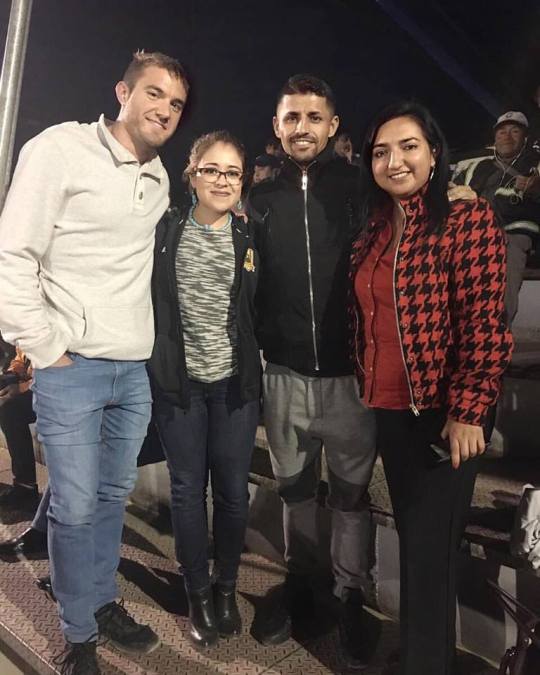
At the soccer game, with a (locally) famous player
The first weekend in January my friend Alvaro came to Xela so I could show him around since he had only visited once before for a short amount of time. Although I’ve lived here in Xela for 2 years there are still some parts I haven’t explored, so we decided to check them out together in addition to me showing him some of my favorite spots.
The following week I worked at the heath clinic in Xela as a translator for a group of medical students that came to do volunteer work. I had been to the clinic once before when I got a rabies shot, but I didn’t know all the services offered (gynecology, pediatrics, family planning, HIV testing/education, laboratory work, pharmacy, and vaccinations). Everything offered at the clinic is absolutely free for Guatemalans and foreigners that come to the clinic. While we were at the clinic I noticed a lot of people lining up for “medical cards,” which are required by almost any formal form of employment. In order to get a medical card one must give a fecal sample to prove to be free of any parasite, a blood sample to prove to be free of HIV, and a saliva sample to prove to be free of tuberculosis. I talked to one of the nurses, and she told me that often times some labs will “sell” results saying that the patient is free of one of the requirements without actually examining the sample – just another example of corruption in Guatemala. Apparently at the beginning of the year it is very common for people to start looking for jobs (as it is in the states for people to start gym memberships), which is why there were so many people lined up in the morning to get these cards.
While at the clinic my eyes were opened to some harsh truths of Guatemala – sometimes the pharmacy doesn’t have a certain medicine a patient might need and the patient doesn’t have the money to buy it in a pharmacy, therefore they settle with something that the pharmacy has that will hopefully cure the illness. The pharmacy also doesn’t usually carry combination medicines therefore doctors have to prescribe three different medicines that do the same thing as one combination medicine.
One problem that seems to be very prominent in Guatemala is diabetes. The Guatemalan diet consists of a lot of carbohydrates (rice, beans, tortillas, white sweet bread, plantains, and coffee is always sweetened), which gets converted into sugars. The medical students had a free “medical fair” in which they tested blood sugars, blood pressure, heart, lungs, and gave medical advice as needed. When checking blood sugars some people had it so high that the machine was unable to read it.
In all there were three translators, but everyone was placed at a different location. I was stationed at the health clinic and all but two of the students knew basically nothing about the Spanish language so that meant I ran around all day translating doctor’s appointments and medical advice during the medical fair. At the health clinic there are medical students at the universities here that do their residencies so they had priority over the American students (obviously because they knew the language), but I tried my best to help translate what was going on and encouraging the American students to focus on learning about the Guatemalan health system as much as they could to observe the differences. In the end I think everyone left very satisfied, and it made me realize how much more I wanted to be a Spanish translator.
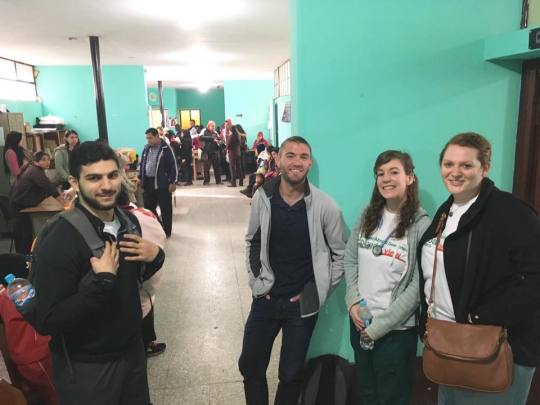

At the health clinic with some of the medical students
As soon as I was done on the last day I took the medical students to help them buy some souvenirs then met up with my best friend JJ. We grabbed a drink at a famous restaurant then went to my house to get ready for a going-away party I was invited to that night.
I met a good friend of mine from Denmark, Mia, through the Spanish school where we both studied. She comes at least once a year to visit her friends here (and actually studied for a semester abroad in Xela). That night she invited me and some other friends to have dinner together at a new restaurant in town. I had a great time because we have a ton of friends in common, so there was never a dull moment. Afterwards we all decided to go out of a bit.
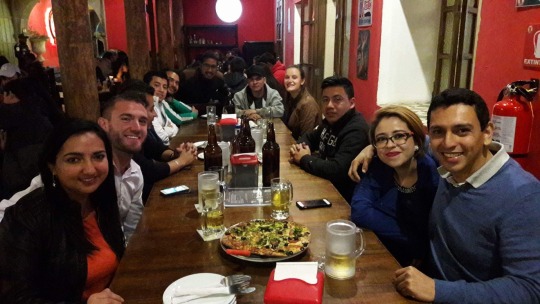
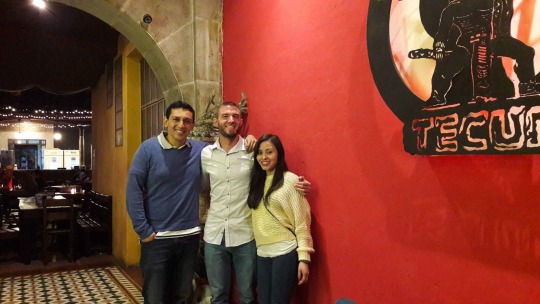
My best Guatemalan friends and me
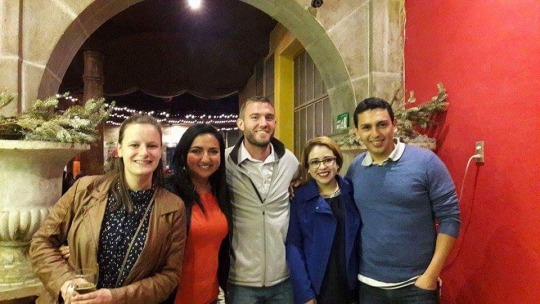
At Mia’s despedida (Mia is on the far left)
That following weekend my friend Alvaro decided to come back to Xela to visit again. This time the highlight of his stay was our trip to the Laguna Chicabal – a scared Mayan lagoon that sits on top of a volcano. One of my friends, Daniela, from Chile, decided to join us. We all met up at the central park in Xela at 8AM then went to the bus terminal. From the bus terminal to where we got off was about 40 minutes, and from there we walked 2 hours to the top of the volcano. The walk wasn’t long but it was definitely steep (and worth it!). We first went to the viewpoint of the lagoon then walked down the many stairs to the actual lagoon and ate the sandwiches we had packed that morning. Afterwards we started our hike back down but got lucky as a pickup offered us a free ride to the parking lot. We talked to the other people in the pickup, and I decided to ask someone if they were headed to Xela. When they told me they were I asked if they would be nice enough to give us a ride – to which they also replied favorably. In the end they saved us not only a bus fare, but quite a bit of time as well.

Laguna de Chicabal


Alvaro, Daniela, and myself
After I dropped Alvaro off at the bus station to head back to Guatemala City I met up with my friend Martiza at her apartment. Her birthday is December 31, and I hadn’t properly celebrated with her so we decided to do it that night. The next day I helped her look for a new apartment because her lease was up soon and wanted to move out.
The following week was my last week in Xela so there were quite a few things I needed to do before I left. I needed to take care of things with my cell phone, the bank, packing and cleaning up my room, and some other random things to take care of before I left. I also went to visit my Guatemalan “family.” My “mom” still has students that stay with her and when I went to visit it just so happened that a student born in China decided to cook traditional Chinese food for everyone. We stayed for quite some time at the house drinking, talking, and dancing.

My Guatemalan Aunt Pati
On January 21 I had my despedida (going away party). I have quite a few friends and I could tell my roommates were a little worried about having a lot of people at the house so I decided to have it a bit earlier on the terrace we have that has a breath-taking view of Xela. I decided to have a little “cocktail bar,” where people could mix fresh fruit with their choice of liquor and mixer – which turned out to be a success. For me saying goodbye is always difficult, especially after forming deep relationships after having lived in Guatemala for two years. Tears and hugs were exchanged while promises were made to see each other again.
On the 22nd I headed to my Guatemalan “family’s” house for a going-away lunch with them. Before lunch was served each member of the family shared a few words with me. It didn’t take long before tears started rolling down my face. I feel extremely lucky to have had the opportunity to live with them, and the bond we share is like the bond I have with my biological family. My favorite part was exchanging random memories we all had of each other from the times I lived with them six years ago.

The cocktail bar buffet

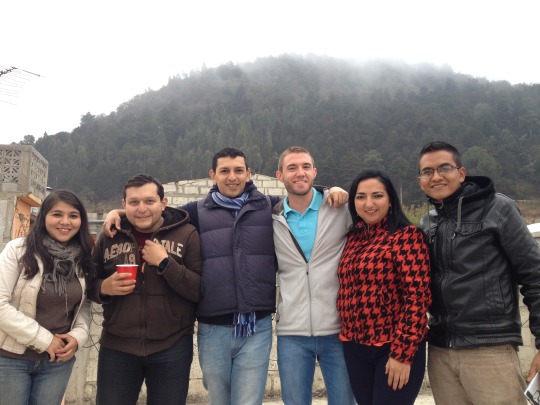
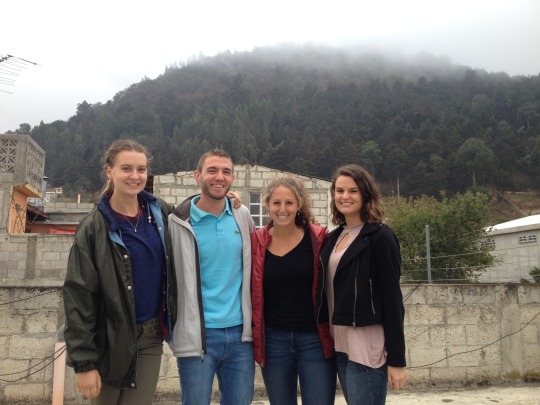
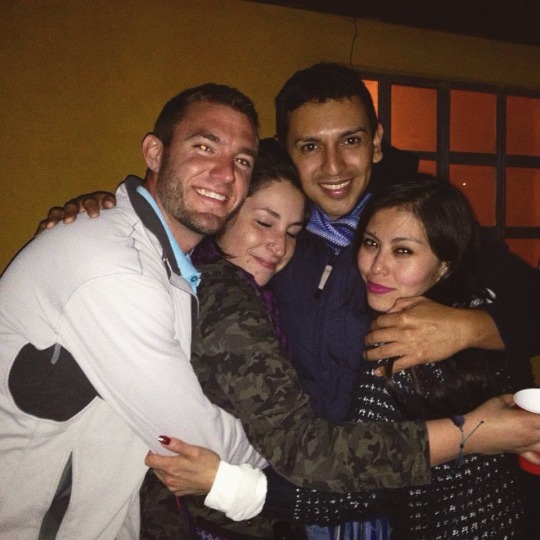
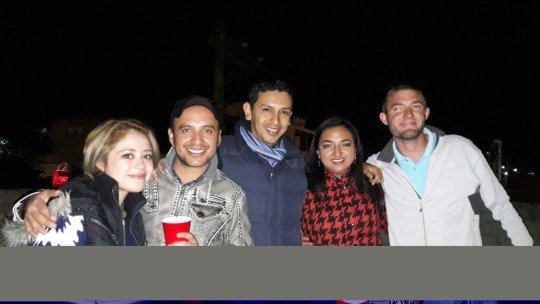

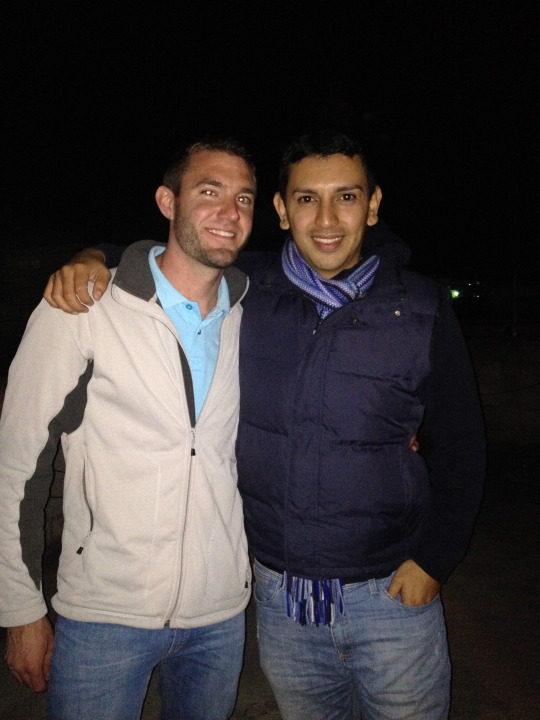
A few party pics
On the 23rd I got on a shuttle bus from Quetzaltenango to San Cristóbal, Mexico. We left roughly at 9AM and got to the border around 1PM. In all there were many shuttles shuffling tourists around so we had to wait for everybody to go through the migration control before heading off to Mexico. At about 4PM we ran into a problem – citizens of a town had blocked off a road as a form of protest. It’s pretty common in Mexico to do that to get officials’ attention, and usually works. For us it meant we either had to wait until they decided to let some cars pass or grab our stuff and walk about half a mile to the other side of the blockade. I decided to walk with some other tourists to the other side and we paid for a bus on the other side to take us to San Cristóbal. That night I was pretty tired, so I just checked into my AirBnB, ate dinner, then went to bed.

The blockade
The next day I literally spent the whole time walking around the city. San Cristóbal is very touristy because of the pretty colonial architecture and churches. I found a pretty neat museum called Na Bolom, which was an old catholic seminary that later became the house of a Danish archaeologist, Frans Blom, and his Swiss wife, Gertrude Duby. In the museum part they displayed the work they had done to preserve the culture and art of the indigenous people living in the Lacandona forest (located in the same region). I enjoyed my time there (most of all the Mexican food), but knew that after a day I had seen most of what I wanted to see within the city limits. That night I got on an overnight bus to take the 12 hours bus ride to Oaxaca.



At the Na Bolom museum


San Cristóbal
I got to Oaxaca at 7AM on the 18th and immediately dropped off my bags at the bus station then walked around the city. I got breakfast in one of the largest plazas – two tamales and Mexican hot chocolate (one of the best breakfasts ever!). It was awesome to literally watch the city wake up as I wondered around the town. Around 1PM I met up with who I would be staying with the next two days – a woman named Maru, her husband, and a family friend that helped drive them around.
Years ago my mom visited a winery in Kansas and became instant friends with the owner, a Mexican woman. When my mom heard I would be moving to Mexico she called her and it turns out her sister had a house in Oaxaca. I got everything worked out, and they hosted me for the two days I stayed there without having met me prior to my arrival. Although they were a bit older I really, really enjoyed my time with them – they were extremely nice people and wanted to show me as much as possible. As soon as we met up they took me to their house to drop off my stuff then we went to some Zapotec ruins at a place called Mitla. Mitla (or Michtlan) means “place of rest/dead” in the Zapotec language. The first evidence of human occupation was in 0-200AD, but it reached its highest point around 950-1521AD. After the Spanish arrived in the area a Catholic temple was built over one of the patios using destroyed prehispanic structures. Basically instead of destroying the ruins at Mitla the Spanish decided to build a Catholic church right next to it. Afterwards we grabbed a nieve (literally snow), which is famous in Oaxaca. The best way I can describe it is as a natural fruit sorbet (and delicious). We then headed to a town called Tule, which is famous for a tree that is over 2,000 years old. It was so large that I couldn’t get it all in a photo. One thing that was neat was that they have little kids that are “guides” that will point out all the animals that can be found in the bark of the tree (dolphins, lions, snakes to name a few). We then went to a market and ate tlayuda, which is basically a Mexican pizza (tortilla crust, refried beans, a type of cheese typical to the region, meat of your choice, avocado, and tomato). On the way back to Oaxaca we stopped at a “scenic view” of the city to watch the sunset. Oaxaca reminds me a lot of Arizona, a state with a beautiful landscape. We then went back to their house, watched a Spanish soap opera, and had chiles rellenos for dinner.


In Oaxaca



Inside one of the tombs

Mitla Ruins

The Catholic Church next to the ruins at Mitla

The tlayuda

The 2,000+ year old tree in Tule

Sunset over Oaxaca
The next day their “chofer” took me to a place called Hirve el Agua (boil the water), which is famous for its petrified waterfalls. What causes them is the water that comes out of the earth (it looks like it’s boiling – hence the name) that has a very high mineral composition. Since it’s only a small amount of water that comes out of the earth it forms the petrified waterfalls as it falls down the cliff. When we got there the first thing I saw was absolutely amazing – nature’s infinity pool. The highly mineralized water first collects in a pool then runs over into the petrified waterfalls, which meant the “infinity pool” was at the top of the petrified waterfalls, in the middle of a jaw-dropping Mexican landscape. Despite the name, the water was actually a bit chilly. After I took a dip we walked to the bottom of the waterfalls then back up them again. I took another dip in the pool then we decided to head back to the house.

The petrified waterfall

At the bottom

Where the water comes out of the earth (in a “boiling” fashion)

Nature’s infinity pool
Lunch was waiting for us when we arrived – carne asada, rice, and a salad. Afterwards we hung out at the house for a while then we all decided to go for a car ride around the countryside. We stopped at a little roadside stand where a traditional chocolate drink called tascalate made from corn, chocolate, sugar, and cinnamon with natural cream that floats on the top. It’s also called agua de los dioses (water of the gods). They also had a sweet drink made from a type of pumpkin and a bread that they soak in vinegar and top with onion and chili for sale, but the tascalate was my favorite. We then headed back to the house to watch Mexican soap operas and have dinner.

The tascalate

January 27th will be a day I will probably never forget – as I boarded the bus in Oaxaca, Mexico, I knew I was turning the last page in the Guatemalan chapter of my life story. Just like watching the season final of your favorite television series I anxiously sat in the bus thinking about my future – what I would experience, learn, how I would help others, and how I would continue growing as a person.
Good feelings.
1 note
·
View note
Text
How Do I Get A Certificate Of Translation?

If you make a world record in your home, but it is not documented, your name won’t show up in the Guinness Book. A degree without the official seal of your academic institute will be of no value. There are many such things in life that prove the importance of following the proper procedure. If a document is not created properly and does not fulfill all the requirements, it will be of no use. In fact, it won’t even be considered an original document. Instead of dealing with the consequences later, people should make sure that they are getting the right documents from their institute or a government department.
The Translation Industry:
Anyone who has ever dealt with documents that had to be presented to foreign officials knows how important translation is. The industry relies on the work of hardworking experts who make sure that every project is completed accurately. Without the efforts of these professionals, no client would be able to get the service they want. It is because of these experts that the world keeps on working properly. People from different parts of the world can apply for immigration anywhere they want, students can get admission in the university of their jobs, and all that would not be possible without translation.
There are various types of services that you can get in the translation industry. However, you must know what type of assistance you require first so you can ask for it exactly. Some of the services are more popular than others, and there is a reason behind that. They are usually the ones that help people with immigration. Since many people apply for immigration every year, translation of their personal records becomes the most needed service.
Rules in Translation:
Like every other field, there are rules and regulations that linguistic experts have to follow. In order to ensure accuracy, they have to practice regularly. But the rules are just as important and without them, accuracy will be of no use in front of a governmental body. For instance, if a translation is not accompanied by the signed statement of the linguistic expert, no official body will accept it.
The rules mean that not everyone can handle a linguistic problem. Only those familiar with the working of the language industry can accomplish this task. They must also be familiar with all the rules in order to provide the right services to their clients.
Certified Translations:
The most important type of service that even the immigration applicants require is certified translation. It is considered the most accurate form of linguistic service. It comes with a signed statement of the translator as proof that their work is accurate. The signed statement makes the translation legal, which is why it is then accepted by the authorities. Since the translator adds their name, address, and contact details under the statement, it adds credibility to their work. If a translator is not certain about the quality of their work, they will not issue the statement about its accuracy. When a professional signs the statement, it means they are willing to put their work out for evaluation. Although it doesn’t usually happen, if there is an issue in the document, the translator can be called by the authorities to prove the accuracy of their work.
How Do I Get a Certificate of Translation?
The signed statement of the linguistic expert is also known as the certificate of translation since it proves the authenticity of the work. Some people think that they can get a template of the certificate from the internet and handle the translation themselves, but that’s not how it works. In fact, they can land themselves into trouble by lying on an official document. The best way for clients to get a certificate of translation is to hire a qualified linguistic expert. They will not only provide you with the most accurate translation but also give you their signed statement with it. This way, you can submit that document to the authorities without any hesitation. You won’t have to worry about its authenticity.
If you are a translator and you are wondering where you can get the certificate, then there are two options for you. You can either create a simple statement yourself or pick a draft from the internet. The information needed for the certificate is pretty basic. You will state your name, the language you translated, the target language, and the title of the source document in your statement. After that, you will add your signature under it. You must add your address and contact details on the opposite side of your signature. This way, authorities can reach out to you if they have any questions about your work. But the certificate matters if you have accurately translated the document in the first place. Those who attempt to translate a paper with the help of the internet and then attach a certificate with it end up regretting it later.
So, it is better to do something right the first time. If you don’t take any risks and go straight to the experts, you won’t run into any trouble. Get the rates first, so you don’t have to face any surprises later. If you choose the right agency, you will be able to get the accurate translation at affordable rates, along with a valid certificate that you can show to the authorities without any hesitation.
Read the full article
#birth_certificate_translation#certified_translation#notarized_translation#translated_document_example
0 notes
Text
What Makes a Top-notch Legal Explainer?
What Makes a Top-notch Legal Explainer?
Lawful interpretation services are actually quick becoming the most essential sub-sector in the translation companies field. Coming from the point of view of the employer, it is probably the best challenging place to sponsor for due to the fact that it demands a nearly unlikely volume of cross-discipline ability from the would-be workers. Here are actually the 3 main credit to consider when seeking an excellent lawful translator: Traduceri Engleza Piata Unirii
1. Eloquence in the specialised language - Many providers are guilty of administering a severe over focus on the 'lawful' part of the 'legal translator' project name. This is actually a gigantic inaccuracy since it puts undue body weight on the relevance of an outstanding legal resume, advising that such lawful skill is plenty of remuneration for sub-fluency in an intended language. This neglects the remit of the legal explainer to find every single cultural subtlety, regional phrase or even linguistic details in the foreign legal paper. Failing to recognise such factors may lead to bad interpretations as well as legal fines - therefore do not agree to just about anything lower than well-versed excellence Traduceri Autorizate.
2. Flexibility is vital - Possessing a varied and also broad legal know-how is actually far better than having a specialist expertise, when it relates to legal interpretation. A functional approach is actually essential if you want to participate in the preparatory client examination time period and also to know intuitively when distinct legal professionals have to be actually brought on board for advise. Generally the explainer must be actually a networker for lawful limbs - a middle-man who recognizes enough concerning every edge of the lawful market to make good common sense calls. The linguist is, firstly, there for their language skills. Lawful capabilities ought to be actually judged on the qualities of the individual's ability to comprehend client needs, out their ability to assert an instance in court. This is a truth that usually averts companies and they are actually at times left with a misfit person that can easily not appreciate the tamer requirements of low-level customers.
3. Lawful administrative expertise trumps court expertise - Following on from the abovementioned factor, a serious risk that often catches out companies is the tendency to ignore legal back-of-office workers. A lot of 'big-shot', court-dwelling legal representatives that possess facility in an intended foreign language stand out of employers and are right away in demanded. Nonetheless, these affable professionals are usually not suited to the extra lengthy, management elements of the interpretation process. History legal staff members, a lot of whom create their technique with the less elegant options of legal book keeping and structure society legislation, are definitely more matched to the qualitatively tinged, data-driven rigours of lawful translation.
Lawful Translation Top Tips
Possessing the proper words and also expressions in area is actually very essential when our team chat about documents with lawful information. One small blunder may trigger an illegal receiving off on a formality or an innocent male being actually sentenced. Making sure that the exact significance is held around to another language is actually of the utmost value Traduceri Autorizate when it happens to converting lawful material.
Lawful interpretation is actually a certain division of translation, which deals with the strongly specialist terminology of the judicial unit and makes sure that all definition is accurately described in a various foreign language. In this quick guide our team will definitely clarify legal translation in even more detail, along with what to get out of the process and also how to make certain that the most ideal individuals are utilized for the job.
Below are our best ten tips which will definitely assist you along with legal interpretation:
Recognizing what really requires converting
Just before you start seeking a translation partner, ensure that you understand precisely what you need to have converting. There are a lot of various specialisms within the legal body, like illegal, work, maritime or immigration regulation. Relying on the situation, each different branch will need particular papers to become translated. It may certainly not be actually necessary to transform the entirety of your material. Exercising which parts of your web content performs and also doesn't require to be converted may assist you save money and time.
Knowing which foreign languages are required
You must make clear which foreign languages are demanded as soon as you have actually functioned out what requires translating. This appears basic enough, regional languages can easily have a habit of making complex concerns. Laws often put on a whole entire nation or even region, but frequently there could be a lot of vocabularies and foreign languages spoken within it, each with their very own special idioms as well as terms. Recognizing these variants is strongly essential. If you remain in any type of uncertainty after that an excellent lawful interpretation firm are going to hire specialists with knowledge of the relevant language as well as division of law.
Partnering with the best
There are a lot of folks who offer lawful translation companies, yet it is very important to become entirely sure that whoever you choose will definitely deliver an accurate translation. There is actually no area for error in lawful interpretation. Before you create your decision you ought to thoroughly look into the market. The excellent applicant should possess adventure in the legal interpretation industry and also a good expertise of the regulation in pertinent countries. They ought to also be actually converting right into their indigenous language Traduceri Autorizate.
Specifying a reference
Specifying a reference of terms is actually an essential part of any sort of interpretation procedure, but certainly never a lot more thus than when coping with legal translation. The legislation teems with vital words as well as key phrases which carry a highly specific legal definition. Making certain that these are converted accurately is highly essential. Conceding a listing of conditions before the interpretation method starts lowers the scope for mistake, guaranteeing that the particular definition of a term is perfectly very clear.
Picking a formatting type
Remember to let all of them understand your popular format type when you pass on all the details regarding the venture to your interpretation companion. Legal records are commonly set out as either a bilingual record, where both the original and converted foreign languages exist side-by-side, or even as a monolingual documentation, equated in its totality right into one more foreign language yet maintaining specs like the typeface and style of the initial.
Discovering the rule
The majority of countries on the planet currently have their personal judicial systems, and also every one will possess its personal specific rules and language. A crystal clear understanding of the relevant legal body is actually an absolute needs to for prosperous lawful translation, as well as although your explainer should manage this, it never injures to have some local knowledge your own self.
Being safe and secure
Your lawful record is probably subject to meticulous personal privacy guidelines. Make an effort to comprehend just how your files require to become dealt with. Safety and security is actually extremely significant when it involves lawful component, and coinciding your interpretation provider how material will be actually kept and transferred prior to the method begins can actually assist to minimise risk Traduceri Autorizate.
Talking
Try and also be actually rather palms on with the translation project. At the beginning of the method, unite as much endorsement product as you can find to send to the translator. Communicate along with them throughout the venture. Doing this aids to ensure every thing is managing effortlessly as well as any kind of issues are actually settled rapidly. An excellent translation provider should deliver you an equated example beforehand in the job. If they don't, ask to see an example, after that deliver all of them with responses concerning the design as well as language.
Making sure it stands in court
The moment the interpretation is actually completed, check the file prior to signing it off. Some lawful interpretations will require to become validated by the linguist in order to be actually taken in courtroom. Whilst a watermark is generally utilized, an authorized statement from the linguist are going to also be enough. Make sure the file is actually proof read, if important via the use of back interpretation. This is actually the process of equating the paper, back in to the initial language, to guarantee that the interpretation is 100% exact. Excellent interpretation providers should include this as component of their service Traduceri Autorizate.
Keeping up to date with changes
New modifications to existing regulations are continually being provided. Even the smallest modifications may have an effect on big groups of folks, and each adjustment in the legislation may need you to change your translated lawful documentations. Following the most recent updates allows you keep your documentations up to date. A great connection with a lawful interpretation business may truly assist within this regard. They must be making use of memory software which makes it possible for fast accessibility to converted papers which can easily then be amended as essential, making time and expense savings Bucharest.
Why Are Legal Translations Important?
Legal interpretation is actually a task that calls for a great deal of competence and also acquaintance along with linguistic rules that apply to rules and also lawful claims.
Interpretations feature taking a documentation in one foreign language and switching it to yet another language whilst sustaining the same significance. Lawful interpretations take care of legal problems as well as phrases. This industry involves equating statutes, agreements, licenses and any type of lawful paperwork. These papers are commonly made use of in lawful proceedings where the preliminary original definition should be actually sustained also after the interpretation.
Legal terminology is incredibly intricate and can differ from one country to yet another. Due to the reality that not every nation has the exact same lawful unit, sometimes legal concepts carry out not possess an equivalent in the target foreign language. Laws and also codes have been actually generated to fit a particular country or even society and also when the lawful condition performs not have an equivalent in the aim at language, the explainer requires to "recreate" the idea and also the whole idea affixed to the legal articulation. "Transcreation" is a re-interpretation of the original idea to fit the reader of the target language in a specific time. If both legal foreign languages refer to various lawful systems Bucharest, it is actually very challenging to discover equivalence between pair of phrases.
Why Are Legal Translations Important?
Codes and laws look for to establish precisely defined rights as well as tasks for certain individuals. The purpose of legal interpretation is to look for juridical as well as etymological similarities between legal texts that belong to various lawful bodies. There are actually some instances where crimes might possess identical meanings in two bodies but are actually not the same; signify different associations which result in different paragraphes. The lawful explainer ought to know intent of the authentic lawful message as well as the analysis (or interpretations) that has actually been attached to that text. Making use of criterion is actually regular of Anglo-American common-law tradition that is built on the teaching of stare decisis. (stand by made a decision concerns).
Errors in legal interpretation can be catastrophic because of the impacts that a lawful mistake might have in the lifestyle and also civil liberties of people. It can likewise have an effect on nationwide safety and security, sharp associations and also bring about suits.
To steer clear of mistakes, lawful explainers ought to be assisted by requirements of linguistic, social as well as cultural equivalence between the language utilized in the source message to and also the target foreign language. According to the expert on Comparative Law, Gerard-René de Groot, the difficulty of legal interpretations rely even more on architectural distinctions between legal units as opposed to on linguistically variations.
Lawful Translators.
To supply precise translations, legal linguists need to recognize the different legislation systems in addition to particular areas within regulation such as Criminal Law, Commercial Law, Property Law, etc. They additionally need to be skilled in lawful creating and also have a comprehensive expertise of lawful terminology. It is vital to delegate lawful interpretations to experts that possess the know-how and also expertise to take care of all of them. It is additionally indispensable to have a centered understanding of Comparative Law system which helps to understand standard legal phrases and also establishments in a global context Bucharest.
What is Comparative Law?
It is the research of the assorted legal devices around the world and also the distinctions and resemblances between all of them. Comparative Law delivers the groundwork to create multilingual thesaurus that try to find equivalence one of the components of the source as well as the intended lawful content.
Legal translators have a hard project because lots of lawful principles were actually stemmed within a specific social as well as political structure and also might possess no counterpart in various other lawful system. They need to search for etymological and juridical equivalence in between the terms to locate the pragmatic as well as functional equivalence in the ideas.
Comparative rule procedures aid to develop a reinterpretation of inappropriate lawful phrases and to accomplish therefore specialized and pragmatist facets of legal foreign language ought to be taken into consideration. The formula is actually certainly not that easy given that some experts prioritize the specialized facets of lawful translation while other put emphasis on the connotative facets of lawful foreign language. The convergence of these two methods can assist in the translation of legal content.
Lawful Translation Services.
Legal interpretation services are playing a vital function in breaking barriers between nations throughout the planet. The premium of solution delivered by lawful interpretation services has to be precise and accurate. There is no area for error in such an important field. The smallest of inaccuracies can possess damaging lawful effects for the groups entailed. This is why before acquiring the solutions of any sort of lawful translation provider; you need to review an entire host of legal interpretation providers to locate which one is actually very most reliable and also professional Bucharest.
Any type of translation business ought to offer services that are actually well versed in both English and also the aim at language. The translators should additionally be actually thoroughly familiar with the legal process in both nations. There are actually a number of traits to keep an eye out for in a good translation company. First and foremost, the business needs to simply utilize internal translators that possess significant experience in the lawful sector. Each legal translator should possess all the essential credentials as well as certificates. He should recognize all legal lingo and jargon in both foreign languages. He ought to also be completely familiar with all the various languages and also subtleties within the target country. Comprehending the numerous languages as well as the social differences will definitely guarantee the interpretations will definitely be actually a lot more exact.
One crucial place where companies play a vital task is certification interpretation. Certification translation is actually necessary for individuals that travel around the planet for business. Each document needs to become thoroughly equated guaranteeing 100% accuracy.Firstly, the provider needs to only make use of in-house linguists who have considerable expertise in the lawful sector. Each legal explainer needs to have all the important qualifications as well as certifications. He should comprehend all lawful jargon and terms in both foreign languages. A single error may offer a person significant lawful concerns in the aim at nation.
Any sort of great translation company ought to know the usefulness of a 100% accuracy and preciseness in each elements of lawful interpretation. Every linguist needs to be totally accredited and also hold all the important certifications. A premium lawful translation provider need to also maintain to day with all lawful improvements in each countries, as well as suit the modifications in their work when needed.
If you are unsure concerning the premium of solution that an interpretation provider delivers, you ought to request for testimonies. Talking with previous clients will certainly give you some suggestion of the high quality of the translations and also the degree of solution. Talking to numerous clients will certainly offer you a better sign of the counted on degree of company.
Legal Translation.
It is common know-how that lawful bodies find to create clearly defined legal rights as well as responsibilities for sure individuals. Nonetheless, each nation possesses its personal particular lawful jargon and linguistic frameworks. Therefore, lawful translation is necessary to make sure trusted correspondence of these liberties and also roles from the original text message into the interpretation Bucharest.
Hence, lawful interpretation in to overseas languages is not a basic job; in reality, you require to possess certain knowledge of law to comprehend the lawful documentations in your very own foreign language. Therefore, it simply can be executed through a qualified linguist providing services for sworn translation who certainly not simply understands legal language yet additionally possesses an understanding of the common law as well as civil lawful devices which are worked with throughout the world.
One need to consider that textual customs depend upon the lifestyle of the initial message and that they possibly perform not correspond with those in the ultimate content. Therefore a correct linguist must identify the aim for foreign language design along with the same function as that in the original paper. To accomplish this, make use of lawful dictionaries as well as data banks, as well as an exhaustive method of information that are going to lead to a trusted and also correct legal interpretation where each and every particular has been profoundly researched.
Perform certainly not spend your amount of money as well as time on interpretation firms that perform certainly not ensure the accuracy that a lawful translation demanded. Rather, depend on a respected company that recognizes that the mistranslation of a verse in any kind of legal paper could eventually bring about claims and a reduction of money.
Additionally, as legal interpretation needs very specialist know-how only use translators that are accordingly trained to translate lawful files. Whether you require the interpretation of an arrangement, electrical power of attorney, witness declaration or even the transcription of an evidentiary strip, you ought to be assured that the converted paper returned to you will be 100% appropriate. Obviously, privacy is extremely vital, and all records received should stay within the stringent personal privacy tips.
Fluency in the specialist foreign language - Many companies are bad of administering a constant over focus on the 'lawful' component of the 'legal translator' task name. Codes and also regulations have been actually generated to fit a certain nation or even society as well as when the lawful phrase does not have an equivalent in the aim at foreign language, the linguist requires to "create" the principle as well as the whole concept attached to the lawful expression. The purpose of legal translation is actually to look for linguistic and juridical resemblances in between lawful content that belong to different legal systems. A high premium legal interpretation business should also always keep up to time with all lawful modifications in each nations, and fit the modifications in their job when needed.
To do this, utilize legal thesaurus as well as data banks, as well as an exhaustive method of records that will lead to a exact and also trusted legal interpretation where every solitary particular has been actually deeply studied.
0 notes
Text
Daily Report 13—11:50 PM, Wednesday, April 1st, 2020
Why is it that I can laze around all day but suddenly get productive after sunset? If the deadlines do not change and I want to sleep at a certain time, why do I only get urgent after a certain time? No exercise today either.
Foreign Language practice was interesting today, specifically the Japanese portion. I only studied Spanish for ten minutes of the fifteen minutes of Drops. Other than that, today would be considered a solely Japanese studying day, what with me being able to maintain my Duolingo streak based on the Japanese section alone. I also maintained the daily streak for KawaiiNihongo, but that is not the important thing.
Memrise gives me increasing amounts of internal turmoil.
Towards the beginning of today, I went through various extremely dubious phrases such as "Do you get naked?" "I do not really like getting naked and public," "I used to hate it too," "but now I like it." Since I say phrases out loud to practice them, I was extremely repulsed.
However, I eventually figured that it probably had to do with the "onsen" (bathing house) vocabulary term from yesterday. I still felt quite awkward and uncomfortable.
Even so, Memrise remains the best Japanese learning program I am using, at least for the time being. For one, it has introduced more kanji than any other program so far—though it could just mean that this program advances more quickly than the others, and I did skip the Japanese 0 course—and it allows me to interact with sentences with conjugated verbs.
Speaking of which, I have realized that even if I do not have time to look at Tae Kim's grammar guide, I have to try to make time because I am getting to the point where I will struggle a lot if I do not learn the intricacies of conjugation.
The course progresses quickly and the maximum daily requirement for the maintenance of a streak is much higher than the other programs. The highest daily requirement is supposed to be 45 minutes, which translates to 20,000 points, but it took me a little over an hour and a half to reach that point today, and I do not consider myself particularly slow at using the program. I do type instead of using the word bank, but there is a time limit on each question, so that should not make too much of a difference.
Anyway, I knew going into Memrise that I had several advantages that most Japanese-learners do not. I counted at least five or six, though I will not disclose them here because they could reveal parts of my identity. What I find interesting is that I was slightly overwhelmed by the total amount of information towards the end of the session.
I would recommend most people to get a solid grasp on hiragana and katakana, and possibly some basic kanji and grammar, before attempting to use Memrise, or maybe start at Japanese 0 instead of Japanese 1.
0 notes